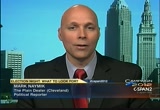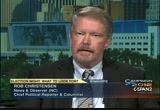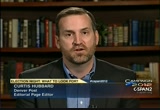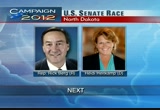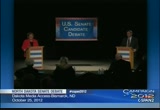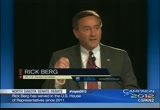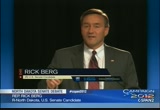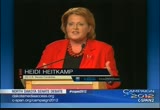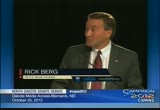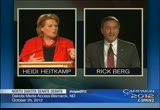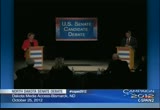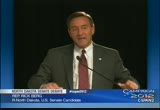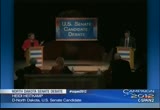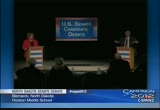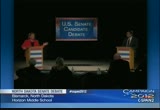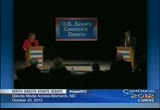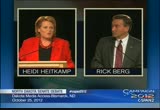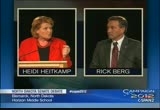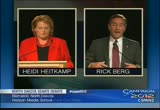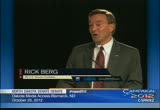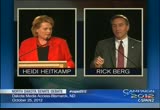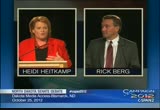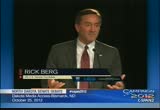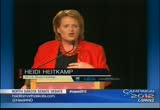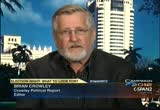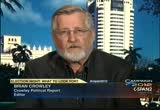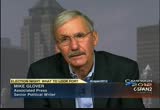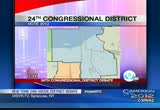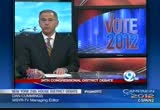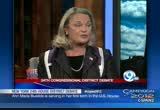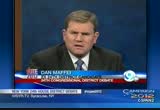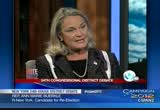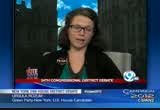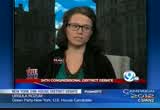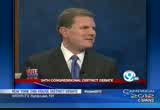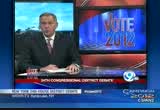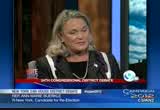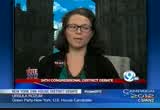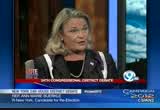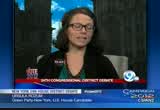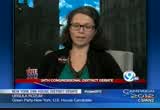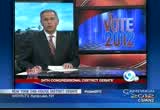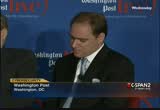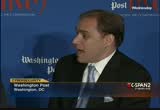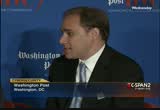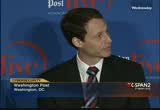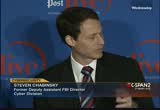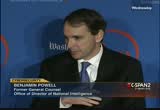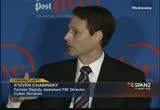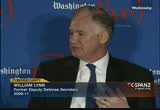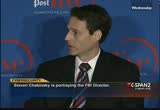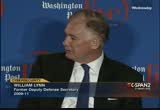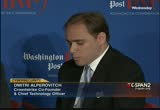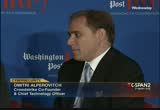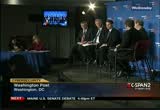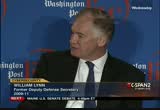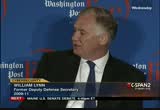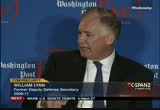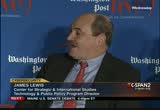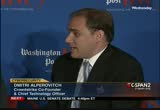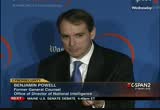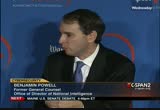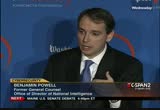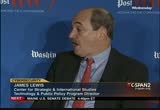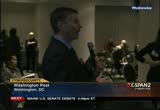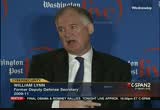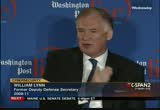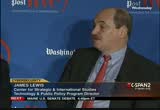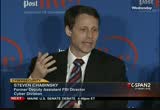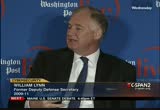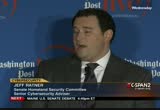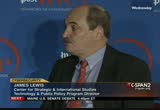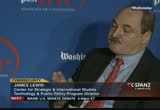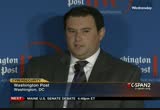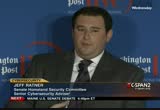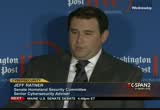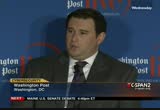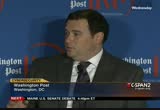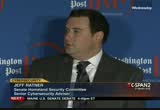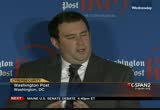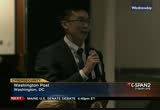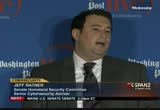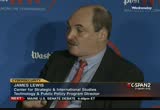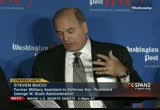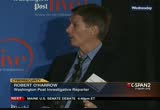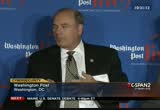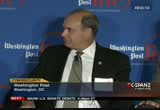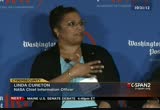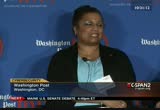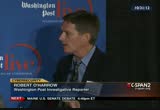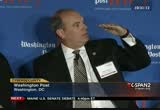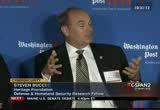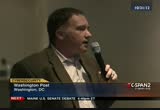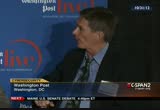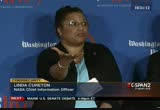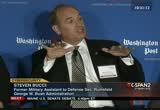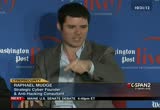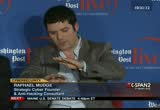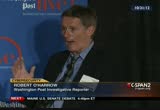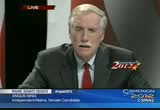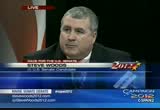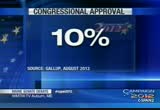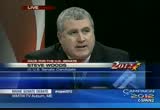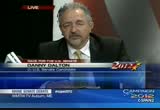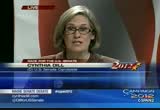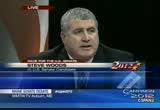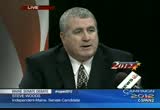tv U.S. Senate CSPAN November 5, 2012 12:00pm-5:00pm EST
12:00 pm
>> here's what a few of them had to say. >> we've got a couple of swing counties, as every swing state has. they've got these sort of bellwethers within the bellwether, and the nice part is one of these bellwethers is in lake county which is just east of cuyahoga county along the lake. they usually turn the results in first, and they're pretty close, they've often predicted the president. i'm going to look there. i'm going the look in central ohio. there's stark county which is the akron/canton where the football hall of fame is in the canton, that area. they're usually a nice bellwether. obviously, we're going to see totals across the state immediately with the early voting totals, the absentee ballots, because those, remember, are sent in. they're processed and recorded, they're just not tallied. so it's literally a push of the button, and at 7:31 we're going to get a little sense of where things are immediately.
12:01 pm
and i think that'll probably, wherever that's leaning will largely hold as an indicator. i do think the race will come down to less than two percentage points in ohio. >> the national presidential race is one that's gotten, is what people are looking at in north carolina, but in the state we have, it's been a battleground -- we have several battlegrounds going on. we have a, we have a governor's race going on, you know, north carolina has had 20 straight years of democratic governors. it's the, it's the longest run of democratic governors east of the mississippi river. that very well could come to an end. the current incumbent governor, democrat beverly purdue who was the state's first woman governor, decided not to seek re-election, and the democratic nominee who is lieutenant governor, walter dalton, the polls suggest is in deep
12:02 pm
trouble. and it looks like former charlotte mayor pat mccrory who lost to purdue in 2008 has maintained a double-digit lead the entire year and looks to be in very good shape to be the first republican governor since jim martin was elected in 1980. so it look like the -- it's shaping up as a very good republican year in the state. >> well, we're going to be watching the suburban counties around denver. you'll hear a lot of talk about arapaho and jefferson counties in terms of whichever candidate in the presidential race wins those counties, they have a much easier path to winning the state of colorado. i'll be looking closely at the number of republican votes that are coming out of el paso county and douglas county and mesa county on the western slope. another swing county that we pay attention to is larimer connecticut which is northern colorado, home to colorado state university.
12:03 pm
then we'll be looking at, um, as far as democrats, we'll be looking at boulder and denver and seeing, you know, if they're getting their numbers the way they want to. and the democrats have paid considerable attention to the southwest corner of the state, um, la plata county, home to durango, so we'll be looking to see if they're banking lots of votes in the southwest corner of the state as well. >> check out c-span's campaign 2012 web site where you can watch the candidates on the campaign trail as well as their latest ads and web videos. also check our social media section to see what the candidates, reporters and other viewers are saying about the presidential race. it's all at c-span.org/campaign2012. >> as part of our campaign 2012 coverage, c-span is bringing you house, senate and governor debates from around the country heading into tomorrow's elections. next we'll take you to north dakota for a senate debate
12:04 pm
between former state attorney general heidi heitkamp and republican congressman rick berg. the two candidates are running for the seat left open by the retirement of democrat kent conrad. this debate is courtesy of dakota media access, and it's an hour. >> moderator: good evening and welcome to this public forum with the north dakota candidates for u.s. senate. rick berg and heidi heitkamp. i'm stacy sturm with the league of women voters, and i will be your moderator this evening. joining me on the panel is the special sections editor for the bismarck tribune and lawrence king, an attorney and also a member of the bismarck school board. this evening's debate takes place at horizon middle school in bismarck and has been organized by the league of women voters. it's co-sponsored by dakota media access and the bismarck tribune. the league of women voters is a nonpartisan organization and promotes the informed
12:05 pm
participation of all citizens in their government. this is intended to be a respectful exchange of ideas. our purpose this evening is to provide voters with information about the candidates and their positions on the issues that affect the people of north dakota. the audience here tonight is asked to, please, reserve applause or any reaction or comments until the forum has ended. tonight's debate forum will be as follows: each candidate will have 90 seconds to respond to each question. following responses to the question from both candidates, we invite them to engage in a dialogue about the issue raised for no more than three minutes. candidates are asked to comply with our time restrictions so we can get to as many questions as possible. our timer tonight is sharon mclaughlin, and she will let you know when you are down to 30 seconds and then 10 seconds and then stop. now, let's get to our candidates. each of you will have 90 seconds to make your opening statements. ms. heitkamp, you may go first.
12:06 pm
heitkamp: well, first off, i want to thank everyone who is, um, in attendance. i wish the television audience could see this great outpouring of interest and support in this debate, and i want to thank the league of women voters and the bismarck tribune for sponsoring this debate. and, of course, congressman berg for coming. you know, about a year ago i got into this race for the united states senate because like so many north dakota tans, i believe washington, d.c. was absolutely broken. it seemed like the politicians in that town believed that what was most important was their political party, what they believed was most important was their own private interests and the special interests. and somehow the interest of the people was left behind. and we needed change. two years ago congressman berg said he could go to washington, d.c. and end the gridlock and take away the partisanship and start solving problems. but when congressman berg got to washington, d.c., he voted 100%
12:07 pm
with his own political party. and i believe he voted against north dakota's interest. he voted for plan that cut $180 billion out of the farm bill including a 20% reduction in crop insurance. he voted for a plan that was, in fact, a plan that privatized and made our social security and our, um, medicare a private system. and i believe a lot of those votes did not reflect our values, and that's what got me in this race. >> moderator: thank you. representative berg, you may go next. berg: thank you, and you can call me rick. i'd like to thank dakota media access, the league of women voters, and the bismarck tribune. i'd like to thank everyone who showed up tonight, wow, it's great, and i'd like to thank everyone who's watching at home. you know, america is going down the wrong track, and if we don't do something about it now, if we don't get our country back on
12:08 pm
the road to growth and prosperity, my 13-year-old son jack, all of our children and our grandchildren won't inherit the same country that we did. there are two philosophies in this race, one that believes in government as the solution, the other belief, my belief, it believes in the individual, it believes in you. while my opponent supports president obama's big government agenda, i'm fighting against the president's failed policies because i believe north dakotans, not washington, ought to be trusted to make decisions about their family, their money and their opportunities. now, i agree -- i grew up in western north dakota, i started a business in north dakota, i served in the best citizens' legislature in the country where we created policies that have made north dakota the envy of the nation. in north dakota we balance our budget. we do it by living within our means and making the decisions today, not tomorrow or next year.
12:09 pm
that's the north dakota way, and that's what i'll take to the u.s. senate. thank you. >> moderator: all right. now we will begin with the questions. the first question will go to ms. heitkamp. some believe this election for president and member members of congress will mark a turning point in our country. the $16 trillion national debt and the growing size and reach of the federal government has made this race for u.s. senate of particular interest nationally. how does your personal political philosophy fit into the conflict other a change -- over a change in national direction? heitkamp: thank you, stacy. i think, first, i do want to agree with congressman berg that there is a clear choice in this election. the choice is between someone who believes that the right way is the political way. i believe the right way is the north dakota way. it is the way that we sit down at tables across the country, across our state, and we solve problems regardless of our political ideology.
12:10 pm
this is the problem with the debt. you know, when president clinton left office, we had a balanced budget, and we had a way forward to retire the debt. we went off the path, and it's not a democrat went off the path or a republican went off the path, we went in the ditch in a bipartisan way. but yet the solutions that we see over and over again are the partisan solutions, the fight back and forth with no one willing to sit down at that kitchen table, you know, the big table and actually sit down and solve problems. and so i would tell you that my personal philosophy is that all problems in america can be solved if we, in fact, put partisanship aside, if we do what's right for the country and we stop playing political games. we have a huge problem with this debt including 40 cents of every dollar that we spend in america today in our government is borrowed. we cannot sustain that it. but we cannot solve this problem by yelling across the aisle.
12:11 pm
we have to sit down together to get it done. >> moderator: representative berg, would you like me to repeat the question? berg: $16 trillion, no, you don't have to repeat the question. you know, admiral mullen, who is the chairman of the joint chiefs of staff, said the biggest risk to america is not iran, it's not north korea, it's not afghanistan, it's not even terrorists, it's our deficit. it's $16.2 trillion today. at our first debate it was 16 trillion. i agree with heidi, we can't have partisan politics. here's the problem: the way we solve this is we have a budget. you know what? the nat has not had a budget finish the senate has nod hat a budget for three years. if we're going to solve a family problem or small business problem, the first step is you need a budget. harry reid, who is the senate democrat leader, has refused to bring a budget up for three years. we can't solve this budget
12:12 pm
problem, let alone balance it, if we can't have the senate majority leader -- who my opponent has endorsed and committed to even though he will come to that table and try and work out a solution. this is the most critical thing. and here's how we solve it just like we've done in north dakota. number one is we need a budget that comes to closure so people can see weaver going to balance it. number two, we steed stability in taxes, number three, we steed stability in regulations. and number four, we need an energy policy like we've done in the north dakota. we could reignite america's engine. we'll have energy independence, it'll be national security, job security. that's the north dakota way, and that's what we need to do. thank you. heitkamp: you know, it's interesting that congressman berg keeps talking about the north dakota way and what they did in the legislature. if you look at the growth in the state budget during the time congressman berg served in the north dakota legislature, it is roughly equivalent -- which is almost 400% -- to the growth in
12:13 pm
the federal budget. i don't think that's a path forward. i think the path forward is quit playing the blame game, quit talking about, you know, harry reid or whatever it is. i was not in the united states senate. i think it's atrocious we don't have a budget. but i think that the reason why we don't have a budget is because both political parties refuse to sit down and refuse to solve the problem. now, there's some excellent documents out there, there's some excellent paths forward. but i believe we need a balanced budget amendment because the only way congress is actually going to balance the budget is if they have to. and that is the path forward for our people and for our country. but we need to be very strategic. congressman berg voted for something called sequestration. it's a disaster. it's a disaster for defense, it is a disaster for jobs in this country. we need to do everything that we can to do in the right way, and that's the surgical way. there's a senator from oklahoma, his name is tom coburn. he's put together an excellent
12:14 pm
document, it's called back in black, and it goes through this, talks about how foolish sequestration is and how foolish those votes were, that we need to be surgical. there are tons of great ideas on how we can stop spending money that we don't have on things we don't need. but we also need to do everything that we can to get people back to work and make sure that we have economic opportunity. because if we do that, if we get people back to work, we not only will see revenue increase, we will see a reduction in the amount of benefits that are paid out. and we have to have a corporate tax structure that works. we have got to sit down and solve these problems together, but we won't by pointing fingers to one political party or the other. berg: i'd like to, first of all, say i am proud of north dakota, and i'll put north dakota up against any state in the nation and, in fact, if our country was more like north dakota, our country would be a lot were betr off. and there's a clear difference between spending in north dakota and the national level. we spent more, but it was money
12:15 pm
we had. every session we balanced the budget in north dakota. that's what's not happening. and i would certainly challenge the senate majority leader who controls the votes, harry reid, who you've pledged your support to has not come to the table. he's not come to the table for three years. sequestration, that was something that passed the house, passed the senate. is it right? no. but as an alternative, we passed other savings. those savings went to the senate. harry reid, again, has not taken those up. we have to get our country back on track. the way we do it is we do bring people together. you have to have a budget, and you have to have a plan. heitkamp: what i think you just said is if you've got the money, you can spend it. i think that's a path forward for disaster. i think we should only be spending money that we absolutely need to spend. and if we're really serious about this problem, we have got to get people back to work, we have got to bring back money that is overseas so we can
12:16 pm
invest it. and i've got an idea of using, i mean, i served in the state of north dakota for, you know, 14 years as an elected official -- >> moderator: just a couple of seconds to wrap it up. heitkamp: pardon me? >> moderator: just a couple seconds, we're over time. thank you. [laughter] our next question will be presented to you by mr. king. >> ms. heitkamp, representative berg, this question will go to you initially, representative berg. almost every plan for reducing federal deficits and the national debt call for some closing of tax loopholes, although that tax forgiveness was put there to benefit one interest group or another. if you agree with that, what specific loopholes should congress close? berg: could you repeat the question? you were cut anything and out on your mic a little bit. >> sure. basically almost every plan calls for closing tax loopholes, although the tax forgiveness was put there to benefit one interest group or another. if you gee -- agree with that,
12:17 pm
what specific loopholes should congress close? berg: our tax system is a mess, there's no question. and so what we've done in the house, what i've supported is a one-year extension on the existing tax structure and then really do a comprehensive tax reform over the next year that would lower the top corporate rate as well as the individual rate to 25% and remove loopholes, as you've said, and things that, quite frankly, you need an attorney and an accountant to figure out how to get 'em. we want to simplify the tax code. and so really our challenge is getting agreement on the other side to start in that direction. the senate has passed a death tax of 55% over a million dollars. this is a total difference in where we need to go, and so from my perspective really a couple things, and the number one issue is getting our economy going again. and the way we do that is we have a simplified tax structure. you know, we had a panel of
12:18 pm
manufacturers that sat down, and they said, gee, a lot of these benefits you're going to get, a lot of these tax deductions you're going to get, and to a person they said get rid of those deductions and give us a lower, simpler tax rate. and so that's the bottom line is to move in that direction. >> ms. heitkamp? heitkamp: you heard congressman berg say he supports a one-year extension. this is the problem. there's no predictability in this tax structure. we hear the can get kicked down the road over and over and over again. that can't happen. now, i want to talk about the tax proposal whether you call it the ryan plan or the romney plan, because independent analysis will tell you that this plan supported by congressman berg does two things; lowers taxes for the wealthiest among us and increases taxes for the middle class. and that is true if you want to make this system revenue neutral. in the individual tax case, i'd never eliminate mortgage
12:19 pm
interest deduction. state and local taxes, charitable deductions, child credits. but what this plan does, it takes away the alternative min money tax -- minimum tax which has an equalizing effect for the wealthiest. that's wrong-headed. the tax loophole i'd close is the one that allows you to ship jobs overseas and get a tax benefit for doing it. we need to create a tax amnesty program that brings that money back, but with the condition that it be reinvested in american jobs. we can fix this tax code, but if we go with another short-term extension, we will avoid the tough work, and we will once again kick a can down the road and do what we don't need to do in this country which is not solve problems. berg: there couldn't be anything more clearer, and my opponent supports higher taxes, using the tax code. our corporate tax is 35%, the highest in the world. canada's 15%.
12:20 pm
we had a proposal that didn't pass to bring that money back, but you know what? harry reid, senate democrats said, gee, we're afraid you might bring that hundred back and not just give it to the employees. we don't want you to pay it out in dividends. what we need to do is what we did in north dakota. in 2003 we tightened our belt, and we didn't raise taxes. in fact, the last ten years we've lowered taxes in north dakota because we've had the revenue, and we've grown our economy. you can't raise taxes on america's economy. half of our small businesses take their taxes as personal income. and so unless you follow the corporate tax and the personal income tax rates, you don't encourage the job growth. that's the uncertainty that's out there. if you're going to increase taxes, who you're going to increase taxes on. the death tax, if you want to give your business or farm or ranch to your children, taxed at 55%? that's ridiculous. so really what we need to do is we need a simple, fair program
12:21 pm
where someone doesn't need an attorney or accountant to do their taxes, and that's going to energize our economy, it's going to grow our economy. it'll make north dakota and our country a global power again. heitkamp: we have a proposal out there. we have the romney proposal and the ryan proposal, and that is, in fact, the proposal that congressman berg supported. and i can state with as much certainty as what i possibly can that that is not revenue neutral. when you eliminate the alternative minimum tax, it will lower the tax for the wealthiest. [inaudible] and it will increase taxes on the middle class. that is not a path forward for job creation, it's not a path forward for the american public. now, he says nothing could be clearer, i have talked over and over again about lowering our nominal corporate tax rate. i think our corporate tax rate in this country is too high. we need to lower it, but we need to broaden the base. he said all these manufacturers are willing to give up their special benefits. they've spent millions of dollars in lobbying to get those
12:22 pm
special benefits, and that's why they continue to persist. what we need to do is we need to figure out how we're going to take the tax system from being one that basically benefits people who ship jobs overseas, get that money back into our economy. and i'll tell you this, i am not harry reid. i don't know how to say it more leerily. i have -- clearly. i have a lot of respect for anyone who serves whether they're on the republican side of the aisle or the democratic side of the aisle. but i am my own person, and i have done a lot of thinking about this. i have a lot of experience in this. and i believe we can move the country forward if we just sit down and solve the problem. but not if we hide behind -- i have a bill that does some deductions and flattens the rate, but i won't tell you what they are. that's not the way forward. >> moderator: all right. we're out of time for the cross-talk. your next question will be presented. >> good evening, ms. heitkamp, representative berg. this next question is on energy,
12:23 pm
and we'll go to ms. heitkamp first. everyone talks about the need for a comprehensive national energy policy. please outline the key provisions that you think should be part of such a policy. heitkamp: i couldn't be clearer. i believe that we have to have a position for fossil fuels, both oil and gas and coal. it is absolutely critical for our economy that we continue to grow our domestic fossil fuel industry. i also believe that there has to be a path forward for renewables whether it's biofuels, geothermal, whether we're looking at, um, doing something with wind which has been incredibly important in our state. and so it is, it truly has to be comprehensive. and there has to be a commitment from everyone to do it. now, let me tell you the other portions of this. we have to have a way to move our energy. we have a declining power grid. that needs to be fixed. we need to make the investments, because that is the certainty and the redundancy that we need for american manufacturing and to grow our economy. the other thing we need to do is
12:24 pm
we need to have pipelines. keystone pipeline, it was absolutely a folly on the president's part not to approve the keystone pipeline. that's a way to move oil, it's a way to expand the north american energy base and fossil fuel base. we have all forms of energy right here in north dakota. i have supported it for years. i have been a defender of the coal industry, a defender of the oil industry, and i will continue to do that in the united states senate. >> moderator: representative berg? berg: well, i think we can learn a lot from north dakota in this. you know, years ago we had many different policies, and they were really disjointed. governor hoeven and i and legislators in the house and senate came together and put together in power, and it includes all of the above. it includes coal, oil and gas as well as ethanol, wind and other renewables. bringing that system together really brought our focus in north dakota together to move in that direction. our challenge in washington is when the president says all of
12:25 pm
the above, he means nothing from below. 85% of our energy in america comes from coal, oil and gas. our gasoline prices have doubled over the last four years. you talk about tough times for the middle class, in america a couple of things have happened. the median income's gone from $54,000 down to $50,000. the price of gas has gone up probably $2,000 a vehicle. and health care, health insurance has gone up $2500. these are problems. we passed 30 bipartisan bills to move energy forward, but the regulatory environment -- again, i go back to harry reid who controls what's voted on in the senate -- has said i hate oil, or oil and coal are making us sick, and they're harming america. my opponent says she's for north dakota, she's pledged her support to harry reid who's anti-north dakota. heitkamp: as much as congressman berg would like harry reid to be
12:26 pm
standing over here, i don't think that's happening anytime soon. so i'd like to talk about my record, and, um, who i am and what i've done. i think -- >> moderator: real quickly. um, ms. heitkamp, can i just remind the audience to, please, hold any reactions until the end of this forum. thank you. heitkamp: anyone who knows what my history, knows that i've been involved in the oil and gas industry, i've been involved in the coal industry for years. oil and gas, when times were tough, when oil prices were low, we were able to pass stripper well exemptions, we were able to pass marginal well benefits for exemptions and reductions on the oil extraction tax, and we were able to do enhanced oil recovery incentives. you know, those are all powerful tools that were used to help bridge is be into the new oil -- bridge into the new oil economy. when i served on the industrial commission, we started the whole series of discussions about horizontal drilling and what that can do and bringing new technologies to north dakota. when i served on the industrial commission and when i was attorney general, i went to
12:27 pm
minnesota and fought for the coal industry. in fact, earned a late night leader award for that work. i am as committed to north dakota's energy industry as anyone can be. and i don't know that there'd be a better advocate in washington than someone who would stand and say i've been there, i have this experience, i can get the job done, and i understand what those challenges are. and so that's what i'm hoping to do when i go to washington, d.c., represent this, this growing industry and include in it biofuels and wind which the republican party's been very hostile to production tax credits. geothermal using every form of energy to make it work in this country. berg: i'd like to say, obviously, there is a problem. keystone's not built. and it's not built because the senate majority leader controls what's voting, has not brought it up for a vote. our president has been opposed to it as well. our coal industry, one of the things that stunned me more than anything else this last year is everything pa came out with new
12:28 pm
regulations on new depa came out with new regulations on coal plants, and they were so stringent, you could not build a new coal plant. it was silent because no one's planning to build a new coal-to-electricity plant because of the regulations and uncertainty. there's a cloud over our energy industry. if we want it to happen naturally, we've got to have stability in our taxes, we have to have stability in our regulations. and we have to encourage rather than discourage the capital to go into and develop it. i -- heitkamp: if i can just comment -- berg: i'm not sure how we're doing this. >> moderator: it's a free-for-all. [laughter] but you do have 30 seconds left in cross-talk. heitkamp: you know, in the last year, in fact, we have built a coal-fired power plant in dry forks, wyoming, and it's an amazing facility. i'm not saying that it's easy, but it can be done, and it has been done, and we need to push
12:29 pm
back against excess regulation. we cannot have epa determining energy policy, and i -- as sure as i stand here, i am firm in that belief, that we have to do everything we can to protect the industry. we had regional hays rules that were, in fact, not even, not even going to improve the quality of the air. >> moderator: thank you. berg: well, and these new -- >> moderator: we're done with the cross-talk right now. it's been three minutes. the next question we'll actually go to representative berg, though, you get to start off. how would you have voted on the farm bill passed by the u.s. senate? in your view what are the necessary elements of a good farm bill? berg: well, if that were the only choice, i'd support the senate farm bill. there are some challenges with it. its link wetlands to crop insurance are a concern for a lot of people in north dakota. you know, my great grandfather home steadied in north dakota, i
12:30 pm
was an ag econ grad, my dad was a veterinarian. agriculture's extremely important to me. my degree is in ag econ. what we need in agriculture long term is we need the markets. we need a strong farm bill that's centered on crop insurance, there's absolutely no question on that, but we also need to insure that we've got open markets and a place for us to get the price that we these for our great quality crops here in north dakota. the challenge that we've had in the house is the house ag committee passed a farm bill as well. that didn't come out of the chamber, didn't come to the 234r50r, and i fought back against republican leadership very hard on that specific thing. i've worked bipartisanly to try and get that bill to the floor. it hasn't been to the floor, but my, my efforts along with other efforts have got the speaker of the house to commit to bring that to a vote and to bring the bill and pass the bill before the end of the year. so this is just the same thing that happened the last farm bill. and so we're not where we need to be, but agriculture is a key,
12:31 pm
12:32 pm
that is absolutely, you have to have someone who will stand strong for the farm bill. now congressman talks about the efforts that he had. yes, at the very last minute you saw a lot of flurry of activity. let's talk about the discharge petition. the discharge petition that you circulated, you got eight signatures from other republicans and there is over 40 signatures from democrats. i don't call that success. i don't think that is the path forward. we have to have a bipartisan farm bill but we have to have people who represent the state who believe it is important enough to sit on the ag committee. berg: that is part of the problem, ag has been a nonpartisan issue for almost two years. republicans and democrats got together when we had the super-committee. we came up with a option for reduction in spending but everyone came together. what has happened the last few months it has been more partisan and that is one of the problems we had in getting the bill out of the house.
12:33 pm
you know, agriculture, the farm bill is only 20% production in agriculture. the bulk of it is nutrition, snap, food stamps. so one of the challenges in getting it passed out of the house people not supporting the changes to the food stamp program that has increased in spending 270% over the last 10 years. and we could not get cooperation, support to have that small change. now the other thing i would like to point out, and this is for what it is worth, the fargo forum said your attacks were manipulated attacks. they said your attacks were politics over substance. as we're trying to pull the farm bill together, a bill critical to north today coat producers you jumped in on the tax. i would like to say, i've been very clear in agriculture. agriculture is important to me. you know, my cousin, passed away last spring and he has a son that is in high school. his son is taking over the family farm. his son is not going to be
12:34 pm
able to farm unless he has a farm program in place that has crop insurance to get the operating loan. agriculture is extremely important to me and north dakota producers are important to me. >> congressman berg, the question everybody in north today coat should ask and the answer is no. you ever the majority in the house. you couldn't get the farm bill passed. you couldn't get colleagues to agree with, no, ifs, and and buts. the question not having a farm bill lies straight at the foot of the u.s. house of representatives. i care deeply about the farm bill. there are farmers out there who are struggling wondering what the safety net program will look like. they have to plan next year's crop. they don't have the certainty. and they don't know. now we'll be negotiating this farm bill in the middle of a fiscal crisis and you really wonder whether we're going to get anything that
12:35 pm
is anywhere with near as good as what the senate provided. berg: if this were not politics i'm sure in the last farm bill that expired you protested that expiration. i don't know where that came up, but i didn't see you protesting the expiration of the last farm bill. it was not done --. heitkamp: congressman berg, we're looking today who is in charge at the house of representatives, who is our advocate in the house of representatives, who is going to deliver a farm bill and the bottom line is, today we do not have a farm bill because of failure in the house of representatives. that was your job. it didn't get done. berg: same as last farm bill. >> moderator: that is the end of cross talk. the next question will be directed from mr. king. >> as a local school board member, education is important to me and my 11-year-old son. what is your education plan, and what role does the federal government have, if any in that? heitkamp: i think the federal government under the bush administration with the
12:36 pm
help of senator kennedy way expanded inappropriately the role of the federal government in education. i think no child left behind was wrong-headed from the beginning. i think it was a federal government takeover of local responsibility and the best education and the best education decisions are decided locally. with that said i think the role of the federal government should be in assisting states in things like title one where you know, you take a small school district, like weimar, where you have two students in need of some special education. it can bankrupt the local farmers providing that special education. there is a role for the federal government there. there is a role for the federal government to begin to look at how we can transition in higher education. i believe that the cuts to the, to the student loan program, and the excess interest that was being proposed being charged on students absolutely inappropriate. we need to have an education
12:37 pm
system that makes sure that our kids have an opportunity to go to college and that college is affordable. i think we need to take a look at long-term, head start. getting kids, ready did to serve and the ryan plan, actually takes literally thousands of kids off head start, which can add to the burden of your local education because those kids aren't ready to learn. and so i'm very passionate about education. berg: well, education is the bedrock to our future, there is no question. north dakota represents a strong state that supports education. number about schools, k-12, higher ed, it is absolutely critical. i would say this as it relates to the education decisions ought to be local. the challenge we have and the challenge i saw in the legislature was a lot of federal programs coming down with wruls and regulations and red tape that made it almost impossible to run and implement the highest impact like we do in north dakota. you know when one size fits
12:38 pm
all rules are made in washington where they assume every community is at least a million people, i mean that doesn't work for hedinger or small towns in north dakota. we need to do everything we can to get the dollars to the states and to the local communities with as few strings as possibility. no child left behind, i mean there is no question that started out bipartisan thing with some good intentions and it failed miserably. i sponsored a bill, the a-plus bill, that would allow states to opt out of no child left behind. we need to again put those controls, put that power with the local school board. put it with the state legislature to move forward. heitkamp: i agree with congressman berg. i think there is an area where any of us who have been in education in north dakota know that if you leave our education up to the federal government that's a path forward that we don't want, that is not a
12:39 pm
path forward for north dakota. it needs to be local decisions. now the good news is that you actually are seeing waivers. i think now only 10 states that haven't gotten a waiver and in the pipeline to do that. the question how do we guaranty a good education outcome? and you know the federal government shouldn't be setting the standards. parents should set the standards. parents should be involved with school boards and with local parents groups, with the teachers. i think the best education in this country is making sure we educate teachers appropriately. we continue to educate teachers and we continue to have the ability to hire people who care deeply about children. i wouldn't be standing here if it weren't for public education and as a good luck thing tonight i wear my grandmother mother's high school graduation ring. she was never so proud in her life as when she graduated from high school. unheard of in her day. it is reminder every day that i am blessed to live in a state that cares about
12:40 pm
public education. i think we need to keep education local. berg: i think the other component here is higher ed. same issues apply but the other part of that is we need an economy that's growing. we're so fortunate in north dakota. you look at our national economy, what barack obama's failed policies have done is 50% of the college grads across america do not have a job. they're either unemployed or not working in their degree area. so what we have to do is create those jobs. 10 years ago heidi proposed paying students to stay in north dakota, another big government solution. pay them $5,000 to stay in the state of north dakota. that is not why we have 680,000 people. that's not why we have our kids coming back to north dakota. we have it because we create ad stable environment, a stable tax environment, a stable regulatory environment and we encouraged businesses to grow and businesses to invest in small business and that's really what we've done in north dakota that caused our growth and success. that is the same thing we need to do is trust
12:41 pm
individuals, create the stability on our federal government. right now we have instability. heitkamp: congressman, i'm not going to apologize for wanting to help students from north dakota who want to stay in north dakota, pay back some of their college debt, which is the $5,000 deal. you know, i am proud of the position that we took, trying to help north dakota students so that they aren't burdened for the rest of their life with incredible college debt. a third of all the benefit that profit, from the bank of north dakota, even when i was there, and i will take some responsibility of this, came on backs of students. that's wrong. student loan programs should be no profit, nonprofit to the government. we have to help students out. berg: well the student loan program was taken away from north dakota for obamacare. another thing to pay obamacare. >> moderator: that is the end of cross talk for that question. our next question will be to. >> this will go to representative berg and on foreign policy. the american ambassador to
12:42 pm
libya was recently killed by terrorists. syria has descend understood civil war and the arab spring has turned stormy. the united states sends hundreds of millions of dollars in federal aid to countries around the world, to democracies and dictators. what should be the basic guiding principles of american foreign policy? berg: fundamentally i have to say that freedom is something we need to encourage across the world but let me talk about christopher stevens and what happened there. his death along with three others is a tragedy. i know that has been in a lot of people's thoughts and prayers. we need to get to the bottom of that. and i'm not here to speculate who did what but we need to find out. the american people need to know. as the thing unfolds i hope it can be transparent and clear. two things will come out of that. number one, if there are people that made mistakes and need to be held accountable we can hold them accountable. also we can learn from that.
12:43 pm
so in the future if we have diplomats abroad we can insure we're protecting them. as it relates to other countries, there is a lot of turmoil in the middle east, you know, from my perspective that is one thing we've done in north dakota. we increased 500,000 barrels a day. if we can become energy independent in america, i think that helps our decision making as it relates to countries around the world and certainly countries that are supporting terrorists. heitkamp: i think our, i think our guiding principle in our foreign policy ought to be america first. let's take a look what benefit's america's interests. you take a look at egypt. under the original peace plan we gave tremendous amounts of foreign aid to egypt. you know what right now? egypt is threatening israel. egypt is threatening israel because of the arab spring. we have to rethink the dollars we're sending to egypt. we have to say these dollars
12:44 pm
are for maintaining a security and a peace. if you're not participating you don't get the dollars. that is job one. we need our commitment to foreign poll to israel. israel is our strongest ally. it is our sister country and we need to do everything we can to fulfill our commitment. which incidentally all the foreign aid we give israel, military aid is spent right here in america on american jobs. that is one of the requirements. but when you look broadly at the arab spring, there was a lot of hope this would continue deepak civil we're falling into what has become not secular governments but religious governments. we need to be gathering up all of our allies and we need to be making a firm statement that this region needs to be stablized and we need to protect people that serve in our state departments. we knee people that serve in all facets, whether ngos or the state department. if we can't secure them, they shouldn't be there.
12:45 pm
>> moderator: can begin cross talk on this. >> i would like to redirect it back to representative berg. you spoke regarding a few specific things but what would you say should be the basic guiding principles, speaking about more broadly? what should be guiding our foreign policy? berg: i mean if you're referring to dollars spent or in general? our foreign policy, america is the leader of the world. we need to look where, where there are opportunities to create democracies and we need to be supportive of those. i mean i think it is a balance. you know, one of the big challenges we have right now obviously in the middle east and iran, iran is the, you know, is getting close to having nuclear capabilities. from a foreign policy standpoint in the middle east, we have to support the democracy that we have with israel there and do what we can to prevent iran from having the nuclear capabilities because their next step is their ability
12:46 pm
to support terrorists. their ability now with today's technology to move nuclear bombs very easily around the world. as it relates to our foreign policy we need to try and again make sure america's interests are kept in first but we need to be close to make sure that we're not putting our country at risk. that these terrorist countries that, you know, have a check and balance on them if you will, i think that should be what drives our foreign policy. heitkamp: you know i can't state this clearly enough. we can not be a nation builder of every nation. we've got to start building our nation right here at home. that is the strongest kind of security that we can have, which is economic security, making sure that we're growing our middle class. when we look at our interests and how we should look at, foreign policy, it has to be through a lens what is best for america. let's take china. china right now isn't the military threat, it is a
12:47 pm
economic threat but we let them manipulate currency the we let them put tariffs and protect through their trade laws their own industry to the detriment of us. so you can't just look at what foreign policy is through the state department. you have to look at what our trade policy is, what our economicsy is and how those things benefit our country. berg: i would say one of our biggest challenges of course is our economic crisis here in america. you know what we saw in 9/11, what we saw the economic happen after that, was a crisis for our country. we have to be strong economically. we have to be strong domestically. that makes us strong. makes us a force to be listened to on a national, international basis. >> moderator: all right. we will move on to our next question. this one is for miss height camp. what do you think the biggest misperception north dak have about you?
12:48 pm
heitkamp: that i can't swing a bat very well. that is not true. i really was, so funny talking to a woman today, and said her kids were watching a commercial, yeah, right, she really hit those balls. really i did. i batted fourth when i played softball. no, i think the biggest misconception about i always feel people know me. i say for the last certainly six months you've said, you have seen commercials that say you can't trust heidi heitkamp. she won't, she is not who she says she is. and i think most people know that that is not true. for the people who are doubting, i want to tell you that i was given a gift 12 years ago, when i was able to survive stage 3 breast cancer. i was given a gift of life. i was given a gift of every
12:49 pm
opportunity to serve the state and do the right thing. i believe in my heart that when i go to washington i will serve the people of the state of north dakota, not a political party, not a special interest, but the needs of the people. that is why i'm doing this. and it is because of my opportunity, what i have been given, this gift of life i feel so strongly. this is who i am. this is what i believe. this is, you can trust me, to represent north dakota. >> moderator: mr. berg, what is some of the biggest misperceptions about you? berg: i think the fundamental issue that i would like to address, and you know i care so much about north dakota. i mean i'm so blessed, i kind of live the north dakota dream growing up, woulding my way through college. starting a business but i just want two things. i'm in this, it is not for me but for that next generation. i want to insure that any one of our sons or daughters or any of us can have the american dream.
12:50 pm
i see that going away. i see it crushed by overregulations and government growing. but one other thing is, i'm committed, i am committed to preserving medicare and social security, committed to preserving that promise for north today coat tans, in particular. >> moderator: what is thes misperception people have about you? berg: i'm a cleaner housekeeper than i am. i would say i mean i would say that i'm committed to doing things we've got in north dakota and doing those things and taking that to washington. i feel so strongly about that. you know, there has been a lot of different ads obviously hit. one of the things i think is frustrating for me of course is the -- attacks on a company i have been involved
12:51 pm
with for 60 years. it is awful to have the people demonized for personal gain in a political campaign. >> moderator: anything else you would like to add? this is cross talk. heitkamp: unless you want me to respond to that. this is what i would say, for the last, how many months we heard i had absolutely no involvement but we have fec reports that say i'm an employer. fec reports that say i own the business. and we have an affidavit signed by congressman berg saying he was affiliated with this company. he spoke as a spokesperson. he did a whole series of interviews in grand forks basically saying we run these companies together. this is how we manage it. and i think it is unfair for him to basically say that it is a clerical error or someone else's mistake when in fact every piece of evidence that you look, except for what is being discussed right now actually points to --. berg: couldn't be anything more far and misleading. when i was out of college we
12:52 pm
start ad business. that business was midwest management. after five years i left that business and started another business called goldmark. it was focused on the commercial real estate business. after i left midwest management it changed its name. i have not been involved in that business for 26 years. but, i'm not being attacked on the business i am involved with as ownership. i'm being attacked on a business i haven't been involved with for 26 years. what is frustrating for me, those employees, those owners, the people that have grown that company, i don't see serve any credit for their growth but they don't deserve to have their efforts and work discredited and deem niced for political personal gain. i mean it would be like a few years prior to that you were in the epa. if i said everything the epa does is because of your responsible, for it today, that is absolutely wrong. you're an attorney. you know the law. you know where my ownership interests were. heitkamp: congressman berg, i'm pretty sure if you tried
12:53 pm
to blame me for everything that the epa did. berg: it would be a long night. a long night. a very long night. >> that you would get a big stamp of false. the local television station here fact checked these claims and put a big stamp of true on them. and so it's a matter of perception. it is a matter of backing away from it. but the reality is, that when you fact check what is said and from independent sources, not me. berg: 26 years i have not been involved in the ownership or management and just awful that we've got a company in north dakota company focused on housing you're taking advantage for political gain, when we have a state that housing is so desperate right now. i think that is wrong and obviously that is frustrating for me. heitkamp: congressman berg the reason why this has been so difficult because out of all of this we hear story of a storiry of people who have been denied their security deposit, have been denied an out, even though they
12:54 pm
suffered post-traumatic stress from assaults. we have heard story of a story. so, you know i think it would be wise for that company to reexamine some of their policies. berg: their door would be wide open for you to sit down and talk to them. >> moderator: that ends the cross talk section from that sections. the next question from mr. king. >> thank you, representative berg, this is directed to you at first. how far would you go to see the u.s. senate and house reach agreement on major legislation and how important is the ability to compromise in doing the people's business and please give specifics?. berg: it is absolutely critical. we're at a point quite frankly in the next two years where one budget away from either going down the road of greece or coming back in prosperity. i will do anything i can to reach across the aisle and reach, reach an agreement. i think the big issues are number one, the budget. number two, is, taxation. we need a stable tax plan so
12:55 pm
people can invest in their small business and grow. they need to have that certainty. the other thing is is regulations. we have haed a number of bipartisan bills, but one of the most important bills we passed out house is the reigns act. what that is like in north dakota. an agency passes a bill or the legislature passes a bill and goes to the agency they write the rules. before the rules are imposed on the public they go to administrative rules, republicans, democrats and they approve the rules before they're imposed on public. that is what we need to do from a regulatory standpoint on the national level. that is what the reigns act did. that is another bill sitting in the senate. has not been brought up. i can appreciate heidi saying that she is not harry reid. the problem is her commitment to vote for harry reid puts him power and he won't bring the bills to the floor. i have 70% of the bills that i have sponsored been involved with, corespond source -- cosponsored on
12:56 pm
bipartisan nature. that is the way we'll move the thing forward. i believe we need to change the control of the senate and reach out in a bipartisan way. heitkamp: congressman berg signed a pledge to grover norquist and said i will agree i will vote the way you want me to vote on all of these issues, on issues of taxation. last year at the end when they were trying to solve this problem of the fiscal cliff, two congress people, one democrat, and one republican, started working on a bipartisan solution to the fiscal cliff and grover norquist picked up the phone and said no compromise. no compromise. if you compromise, we will come after you and get you in the primary. we will take you out of your seat. it scared people away from actually getting it done. these are the partnerships congressman berg has established and it is, it does not bode well to send someone who establishes those partnerships when you're talking about
12:57 pm
compromise. and so when you look at my record, of working across the party lines, and across party aisles, i think you will see some kind of remarkable things. partnering up with the constitution party to fight back on privacy invasions. partnering with the head of the republican party to protect private property. partnering with anyone who will work with me in the legislature to protect kids. i have a record of working across party aisles. i don't think that there really is a record, specially in the legislature, that congressman berg has about being very bipartisan. berg: well, i think, you know, i mean i have worked for 26 years in the north dakota legislature. we do come together. we get things done. the problem out in d.c. is partisanship. the best example of the partisanship is obamacare. here's a bill that was passed, didn't go through the normal committee process. it was done behind closed doors. there are republicans in the u.s. house of representatives, physicians their life is taking care of
12:58 pm
patients. they weren't included in any of the debate. we all know the quotes by nancy pelosi speaker of the house, we have to pass it to see what's in it. there was not one republican vote on the health care bill. health care is too important to try to solve on a partisan nature. but yet that's what happened. it passed without a republican vote in the house or senate and it was something that each day we're now looking at the $1.7 trillion cost, the independent board that's going to make decisions for seniors. the 716 billion out of medicare, but the most frustrating thing for me when that passed, my opponent didn't stand up and say, hey, this needs to be bipartisan. my opponent held rallies around the state saying we have to get this passed we've got to get this passed and see it in our rear view mirror. the republican message is getting out. that is not bipartisanship. heitkamp: congressman, neither one of us were in congress when the affordable care act passed.
12:59 pm
one has been there since then. one has as mantra which is partisan mantra of repeal and replace, voting 33 times to repeal the act, never once introducing a bill that would replace. so, that's the record. and let me kind of explain why that is significant because i think if you came and said, as i've been saying there is good and bad in this health care law. we need to keep the good and get rid of the bad. if somebody from the republican side had actually extended that hand and said let's fix this, let's move forward, let's get rid of the bad stuff i think there would have been a whole lot of better dialogue we would be further ahead. i agree with kong a man berg. this is -- congressman berg. this is far too important to politicize. for the last two election cycles there is unwillingness to sit down and solve the problem of in this country of health care because they rather use it political wedge issue to get elected that is almost too cynical. that is one of the reasons
1:00 pm
i'm in this race. i'm tired of cynicism. i'm tired of partisanship. this is way too important and we need to do everything we can. berg: there couldn't be example of partisanship what is out there but obamacare . . >> moderator: we are going to begin with our closing. you now each have 90 seconds to provide a closing statement, and we will start with you, representative berg. berg: i'd like to thank our sponsors, the moderators, like to thank heidi, everyone that's here and everyone that's
1:01 pm
listening at home. you know, here in north dakota we don't hide from our problems, we fix them. we don't wait for someone to tell us when to work, where to work or how to work, we just work. and we'd rather live within our means than force our kids to live with our debt. you know, as i've traveled north dakota, i've talked to people that have concerns about the challenges facing our country. but one guy summed it up, and he was a superintendent s and he said to me every day i see students, and i'm worried about their future. he looked me in the eye and said, rick, you've got to get this fixed. that's why i'm in this race. i'm in this race for my 13-year-old son, for our children and our grandchildren. i'm running to stop washington from ruining our economy with debts we can't afford to pay back. i'm running to stop overregulating our economy and start growing our economy. i'm running to stop obamacare from making our health care decisions for us. i'm running because i believe we can fix this, and we can restore
1:02 pm
the promise of the american dream to our children and future generations. if we take the north dakota way to the u.s. senate. so i'm asking for your vote, and i'd really appreciate your support in changing america. i know we can get this done. thank you and god bless. heitkamp: i, too, would like to thank congressman berg and all the people who attended tonight and certainly the people who hung with us and who are watching the debate. um, you know, i like to tell a story because after we have long discussions across north dakota, and i've been everywhere in the state, and i've talked to all manner of people. i have had so much fun in this reconnecting with north dakotans. and after we talk about partisanship and what's destroying our country, what's destroying our future for our children because we don't solve problems, because we have a government of slogans and not solutions, we have a government of partisans who don't care enough about the american public to do the right thing. people say i get, i get that you feel that way, and i really
1:03 pm
believe that you think you can go to washington and fix it. so tell me how you're going to do that, because that place is so broken. and i tell them a story about when i was attorney general, and wiz fighting the -- i was fighting the fight on domestic violence and getting out there and trying to change the way we dealt with that problem. an older gentleman came up and put his finger if my face, and he said listen here, girlie, men will always beat their wives, and you can't stop them. and i said, you know, i don't think that's true. i certainly hope it's not true. but i do know i can't live in a world where we don't try. i want the opportunity to try to fix america's problems, to fix the problems for our future and for my children and for rick's son and for all of the children of north dakota. for all of our futures. thank you so much. >> moderator: i would like to thank the candidates tonight. i would also like to thank dakota media access, the bismarck tribune and the
1:04 pm
volunteers from the league of women voters. thank you to the viewers at home and also the audience here tonight at horizon middle school for taking time to learn more about our candidates for the u.s. senate. this recorded program will play several times on government access cable channel 2, it will also be available for online viewing at freetv.org in the days leading up to the election on november 6th. before we close this forum, i want to remind you that voting in north dakota is very simple, and you can find out voting information at your county auditor's office or from the office of the north dakota secretary of state. thank you and have a great night. [applause] heitkamp: thank you. >> the presidential candidates today are making their final push in key battleground states to get supporters to the polls for tomorrow's elections. the president has stopped in madison, wisconsin, columbus, ohio, and later tonight in des moines, iowa.
1:05 pm
mitt romney also with a hectic schedule today campaigning in sanford, florida, then traveling to virginia for rallies in lynchburg and fairfax. later he's in columbus, ohio, and wraps up his campaign in manchester, new hampshire. tonight over on c-span we'll have live coverage of both candidates' final campaign rallies. that gets underway this evening at 10:50 eastern. c-span asked reporters from around the country what they'll be watching for tomorrow on election night. here's what a few of them had to say. >> i'm going to be watching the democratic margin in broward, dade and palm beach counties. it is critical for the president that he has very large numbers in those counties. that's where he builds up his lead. in 2008 the president won 14 of 67 counties. so he -- and, obviously, the more populace counties are the ones he won, but he needs to
1:06 pm
really win big in those counties by several hundred thousand votes. you know, the south florida margin in 2008 was 535,000 votes. and, you know, if he doesn't, if he doesn't do well in south florida, he's going the lose. he's going to lose. he also needs to, he needs to at least keep it close in hillsborough county, the tampa bay area. the republicans would do well to win big in hillsborough county. the republicans will win in a lot of the smaller, rural counties, they should do well in southwest florida, the fort myers, sarasota, collier county area. if we see any slippage in that area, that would spell some trouble for mitt romney. orlando, the democrats should win the orlando area. the president should benefit from the large puerto rican population that's heavily democrat in the orlando area. if we see him not doing well in the orlando area, then it's
1:07 pm
going to be a long night for president obama. >> well, there are a couple of key areas. first of all, let's go to eastern iowa, and let's look at scott county which on the iowa side of the border would be davenport and bettendorf. a couple hundred thousand people. it's a swing county. davenport is industrial, transdemocratic. bettendorf is more suburban, trends republican. very, very swing district. it goes both ways depending on the election, so it'll depend on turnout out there. and if you go to the northwest corner, northwest quarter of the state, that's a rural, very, very republican area, and one of the things we'll be watching for there on election night is turnout. because that's an area that trends republican, but it's an area that's more or less evangelical christian, and they're not excited about mitt romney. the republican, he doesn't energize them. so we'll see what turnout looks like in northwest iowa.
1:08 pm
those two areas if we watch turnout in those two areas, if it's very heavy in the quad cities, that's good news for democrats. if it's very heavy in northwest iowa, that's good news for republicans. so we're watching turnout there. the central part of the state, des moines, polk county is a democratic county, and we'll watch turnout there. democrats have to come out of here with a 10,000-plus plurality of voters in polk county. the democratic heart of the state. so we'll see what kind of margin that barack obama has here. >> the same course we've been on will not lead to a better destination. the same path we're on means $20 trillion of debt at the end of a second term that he won't have, it means crippling unemployment, it means stagnant take-home play, depressed home value, a devastated military, and by the way, unless we change course, we
1:09 pm
may be looking at another recession. so the question of this election comes down to this: do you want more of the same, or do you want real change? [cheers and applause] >> we know what change looks like and what governor romney's selling ain't it. [cheers and applause] giving more power to the biggest banks isn't change. another $5 trillion tax cut for the wealthy, that's not change. refusing to answer questions about the details of your policies until after the election, that's definitely not change. [applause] ruling out compromise by pledging to rubber stamp the tea party folks in congress, that's not change. changing the facts when they're inconvenient to your campaign, not change. >> tuesday night watch live election coverage on c-span with president obama from chicago and mitt romney in boston. plus key house and senate victory and concession speeches from across the country. and throughout the night your reaction by phone, e-mail, facebook and twitter.
1:10 pm
live coverage starts at 8 p.m. eastern on c-span, c-span radio and c-span.org. >> we continue our campaign 2012 coverage with the look at a u.s. house race in new york. freshman congresswoman ann marie buerkle debates dan maffei. it's hosted by wcny in liverpool, new york. ♪ >> moderator: well, good evening, everyone, i'm dan cummings, and welcome. we're very glad you're with us. on tuesday central new yorkers in four counties will choose a representative for congress, the newly-drawn 24th congressional district. let's take a look at the 24th. that district now includes the
1:11 pm
counties shaded in light blue. all of wayne county and roughly the western half of aswego county. if you are a registered voter in that light blue-shaded area in the 24th, you have a choice to make this year among three candidates on election day, and if the polls are accurate, every vote will matter because this race is considered a toss-up, too close to call. and so if your undecided tonight, the next hour may help you make up your mind and in turn may help decide this election. let's meet, now, the three candidates for congress in central new york's 24th congressional district. from left to right, ann marie buerkle, the incumbent republican congresswoman with running for re-election. in the center of your screen is ursula rozum, ursula is the green party candidate for congress in the 24th this year, and on the far right is democrat dan maffei, challenging for the seat as well. each candidate will have 60 seconds to answer my questions, and we will allow rebuttals if needed and as needed, and if we
1:12 pm
do need them, an additional 30 seconds will be given to each candidate to debate each other until we move on to the next question. and based on a drawing just moments ago, the very first question will be answered first by congresswoman ann marie buerkle. i want you all to take a look at this graphic, i'll tell you what it meanses, but it's based on a report first published by bloomberg business week. it shows in that red line that takes off that combining medicare, medicaid, social security and the interest on the national debt, all of those combined will exceed total government revenues in this country by the year 2025. and then by 2040 will be 50% more than all the government currently collects in taxes, and that assumes that the tax collected coverage are about 20% of gdp which is a big assumption and a big if. so, come wong woman buerkle -- congresswoman buerkle, how would you propose changing the entitlement programs to keep the
1:13 pm
program solvent? it's clear that taxes won't get the job done. buerkle: thank you, dan. as evidenced by what you just showed us, we have a problem in this country, and unless we have the moral fortitude to get a balanced budget amendment in place and really look at these into entitlements and where our money is going, right now the current entitlement systems and the way they're set up, they're not looked at, there are no changes being proposed to them, and they just continue on. we know how dramatic medicare and medicaid spending has gone up, and it creates a tremendous burden on our property taxes here in the county. so we've got to do, and i think what the house did last year was cut, cap and balance where we cut spending, where we cap our spending and we put a balanced budget into place so that we have a spending plan. the problem is that the senate has failed to take up a budget. so there is no serious spending plan on the table other than what the republicans have proposed, and it's so difficult for us to negotiate with
1:14 pm
ourselves. >> moderator: ms. rozum? rozum:. i support lifting the tax cut that exists now on social security taxes, and we need to have those making over $110,000 contributing to social security. so i support lifting the tax cap and to stablize health care costs, stabilize medicare costs i am in favor of medicare for all. multiple studies have shown that this is the most cost effective system because it takes the profits that are going right now to the private insurance bureaucracy and the monopoly profits of the pharmaceutical companies and puts them into care. so really if we're concerned about preserving these programs for the people that need them, the working people in central new york, we do need to reform how these programs work. so we need to lift the tax cap on social security and need medicare for all. >> moderator: mr. maffei? maffei: the most important thing
1:15 pm
to do is we have to make sure that we balance the budget, but do it in the right way, not on the backs of our seniors or the middle class. we should do it the way president clinton did it, ask for shared sacrifice, particularly from millionaires and billionaires who can afford to pay more if they go back to the clinton rates. we should get rid of tax breaks for oil companies. yesterday exxon again showed that they have record profits. we can save money where we should, but i will take one little exception with the question. you mentioned, you put all so-called entitlements in one place. there certainly are budget issues, and there are some issues with social security and medicare, but i do not, dan, i do not think that those are the problem. social security and medicare need to be adjusted, but they don't need to be thrown away. we had over 50% of seniors in poverty before that. now it's less than 10%. we can make those adjustments, but we need to protect them. >> moderator: well, okay. but let's go around this again, we'll start with ms. rozum, we take it one at a time, medicare.
1:16 pm
even under the aid ford bl care act -- affordable care act, medicare won't survive past the next decade or so, that's why i'm asking this question. do you favor turning part of this program over to private vouchers for those under the age of 55, and if not, what specifically, please, would you do for medicare to make sure that that red line doesn't keep going right through the roof? rozum: well, like i said in my answer before, i do support medicare for all, so i don't support the voucherrized program. our health care should not be a profit-driven industry. it needs to be care driven. and as patients and consumers, we've had the choices of doctors, and when we can be constrained by the insurance bureaucracy. so made care for all does -- medicare for all does stabilize costs. >> moderator: mr. maffei. behalf behalf we have added -- maffei: we have added nine years from what it was, but the key thing we have to do is get health care costs down. that process has been started, but it needs to continue, and
1:17 pm
that means we have to be able to negotiate again and work to continue to lower costs, particularly for seniors. but voucherrization is the worst thing. that would mean that every senior would be about $6,000 short of just affording what they can afford now. and the worse thing about it is it doesn't even work. under the ryan plan that ann marie buerkle supports, we wouldn't balance the budget until 2040, and medicare would become a program where, sure, you'd have a certain amount of money, but there would be no guarantee whatsoever that that money would be able to afford any level of coverage for the senior. >> moderator: ms. buerkle? buerkle: i think, dan, in all of this campaign there have been a number of distortions and lies promoted by dan maffei, and this is one of them. the affordable care act cuts medicare for current seniors by $700 billion. medicare has been changed for our seniors right now unless we repeal this affordable care act. the ryan budget is not a voucher
1:18 pm
program. it is a needs-based, government-supported premium program. it had bipartisan support. senatorwideen from oregon put together a plan with the house, and that plan was as you turn and you become eligible for medicare, you have choices. you can shop around for a medicare plan and have the government subsidize and provide premium support for you, but it's needs-based. and the thought with that is that if you are wealthy, you don't need that premium support. that's where we'll help to get the system back on its feet and make it solvent. the other part of that is you can choose within the ryan plan, you can choose to stay in the current government-run medicare, and i think this scare tactic for our seniors has been reprehensible. >> moderator: but it would pull $700 billion out of the program as well, wouldn't it? 30 more seconds from each of you on the ryan plan. he'd also take a lot of money out of medicare, right? buerkle: that's where he started, but what's different with ryan's plan versus this
1:19 pm
affordable care act, the affordable care act uses that $700 billion to fund the entitlements in the other parts of the affordable care act. ryan put that money back into the medicare system to make it solvent, to make it healthier so that current seniors receiving medicare can count on that plan to be there for them. >> moderator: ms. rozum, you get 30 seconds more here. rozum: what we're hearing, this back and forth, this shows how complicated and how dysfunctional our health care system is right now. and i'd be against repealing, for example, the affordable care act, but we need to really improve it, and that's why i support medicare for all. to make it easier on employers, for example, without having to worry about the insurance bureaucracy that's really who profits in our current health care system. i'm opposed to the affordable care act, we need something better. >> moderator: mr. maffei. maffei: we've counted on them for so many years, so many generations. what ann marie buerkle says is,
1:20 pm
well, don't worry if you're over 55. in fact, there are some cuts she supported even if you are over 55. but i don't just want it to be solvent for people over 55, i want it to be solvent for future generations because it's been such an important program. that's why i'll fight for it. >> moderator: start with you and try to wrap up this health care thing because i know where you stand, but give yourself each a minute to talk about it. if the next congress should attempt to repeal the affordable care act, and if you're a member, would you support it? if you don't sport it, and i know you don't, what parts of this health care law would you change? what would you support? maffei: yeah. well, i think there are several areas where we do need to make changes, and part of the problem, part of the reason why i wouldn't support repealing the affordable care act is it's not going to happen. and there are a lot of things in it that are very important. for instance, we do need to stand up to insurance companies. we can't just give away the store, particularly with
1:21 pm
medicare, send seniors out in the private insurance market, give them a voucher and say, okay, go fend for yourself and, hopefully, the private insurance companies won't take advantage of you. what we do do is we make sure that people have coverage even with pre-existing conditions. we make sure that people don't face lifetime limits. i knew a woman, nancy, god rest her soul, she passed away of cancer, but she was not only a cancer patient, but she was a cancer patient advocate, and she ran into so many people who had to face cancer and bankruptcy at the same time. we avoid that. so there are a number of things i would change certainly to help lower costs, but we shouldn't just repeal it, we should move forward. >> moderator: ms. buerkle? buerkle: well, as you know, i've been a very ardent supporter of repealing the affordable care act, and two year ago when i ran it was because in principle i disagreed with it. but over the last 22 months i've heard from upstate medical center who fears bankruptcy because of the loss of funding
1:22 pm
they'll receive because of the affordable care act. just recently laid off 25 people. st. joseph's has to pay a $3 million penalty pursuant to the affordable care act. welsh allen has laid off 10% of their people because of the tax. this law was not bipartisan, it was not well thought out. it is doing nothing to decrease the cost of health care. there's no tort reform in it. it really puts the government squarely in the middle of our health care decisions, and when you talk about the cuts to medicare and the impact that this will have on our seniors, this law needs to be revised, it needs to be repealed and revised including some of those good points with pre-existing conditions, keeping your child on your policy til they're 26, the doughnut hole for medicare, those are good things. that's what we hear people like. they could be rolled into a new law. >> moderator: ms. rozum? rozum: i would not support repealing the affordable care
1:23 pm
act because there's too many people just like; staying on your parents' insurance into your 20s, insurance companies can't drop you because of pre-existing conditions. these are good things. i would work with the progressive members of congress and with people around the country to pass a bill like what's been proposed already, a medicare for all plan across the country that would get the insurance companies out of the way, that would allow -- and also that would allow medicare to negotiate with drug companies, because that's one of our problems right now is drug prices are too high because medicare cannot negotiate with the drug companies to bring down the costs of drugs. and so this discussion about health care is indicative of the dysfunction in washington because the affordable care act and its insurance mandate is based on a plan that was originally developed by republicans, and now no one can agree on it which just shows it's not working for the american people, and we need something better. we need medicare for all. >> moderator: ms. buerkle, we're expecting something from congress after election day to
1:24 pm
deal with the fiscal cliff, as it's been called. there could be large tax increases and large automatic spending cuts if congress does nothing. they'll probably do something because if you don't, economists are pretty sure we'll have another recession. so what should be done to get a broader deficit reduction plan in place combining, well, you tell me, extend the bush era tax cuts if whom if not for all and why? buerkle: well, the house already voted several months -- a couple months ago, actually, with bipartisan support to extend the current tax rates for the next year. one of the problems we have with our economy is that there's so much uncertainty when it comes to businesses. they don't know what regulation's going to come down the pike, so they hunker down, and they don't grow, they don't expand x they don't hire. we've got to, we've got to deal with sequestration. but the budget, those tax rates should be extended per year, and we should not raise taxes. my personal belief is we should not raise taxes on any americans. it will disseparately effect the
1:25 pm
middle class, and in an economy that's so fragile as the one we have right now, it would be a mistake to raise taxes. the last congress in 2010 knew that. president obama knew that. you don't raise taxes when the economy is so fragile. it will hurt, and it will impact businesses and the job creators. and what we want to do is encourage them and help them grow so they can hire and get our economy back on track. >> moderator: so you'd leave them in place for the next year and beyond. buerkle: i would. i believe it's the right thing to do. >> moderator: ms. rozum. rozum: i would support progressive marginal tax rates on the top 10%, those that have done well in our economy in the past 40 years. i support the eisenhower rates that had about 12 -- two the dozen brackets. and with the eisenhower rates we could raise $1.2 trillion which is more than last year's deficit. but i would be in favor of spending those revenues to stimulate the economy, because the real problem right now is that consumers are overindebted
1:26 pm
and out of work. so private businesses can't hire and can't produce and expand production if there's no customers. so we need working people need to be put back to work and need money in their pockets. i'd also support cutting the military budget by 50% saving us $350 billion a year as well as closing corporate tax loopholes and ending subsidies and giveaways to big energy industries. >> moderator: mr. maffei. maffei: well, i wouldn't go quite as far back as president eisenhower, but i certainly would look at president clinton for some indication of what we need to do. i do think we need to share the sacrifice, so i guess i'm in many between with. i think we can protect small businesses and farms by not raising taxes on any income under a million dollars. when you get to over a million dollars, that's not -- we're not talking about small businesses and farms then, we're talking about multimillionaires and billionaires. and if we are, then we can negotiate that. and then i do think we've got to get rid of these tax breaks that help jobs move overseas,
1:27 pm
repraise those with better -- replace those with better tax cuts for manufacturers here at home and get rid of those tax breaks for oil companies. ann marie buerkle, her rhetoric is good. she went to washington, and she voted to raise taxes on every working family in new york state. john boehner didn't vote that way, and it didn't pass. but she was the one member of this delegation, of the entire congressional delegation who voted to raise taxes on the middle class. so the wealthy, no -- >> moderator: we'll go 30 seconds more on this starting with congresswoman buerkle. buerkle: well, what dan maffei constantly does is distort my record and tears it down because he's unwilling to take responsibility for his own record when he was in congress. you know, records are real, and one has to be responsible for them. the issue with taxes, and he talks about over a million dollars. so many of the small businesses, and if you talk to them in the district, file a personal tax return. they file a subchapter s.
1:28 pm
raising taxes on anyone will disparately effect small businesses. they don't need to be taxed any further. >> moderator: go ahead, ms. rozum. rozum: sure. i support the the eisenhower rates because we know they could raise $1.2 trillion, and what we're not hearing is how they plan on raising the money to cover the deficit. dan's plan covers 5% of last year's deaf fit as -- deficit as best, best, so which programs do they want to cut, or do they plan on running deficits? >> moderator: dan, you get another 30 seconds before i go back on that one. maffei: actually, we do raise 70%, actuallying 81% of what the president would raise if you cap it at a million. but, look, i think it's .1% of the district, so this idea that it's small businesses and farms in the district that pay over a million dollars, look, ann marie
1:29 pm
buerkle is trying to protect her wealthy friends. e realize that there's a point of view there, but this idea that i'm distorting her record, she's been the congresswoman for the last two years. >> moderator: okay. we'll see what happens on tuesday for the next two years, that's why we're all here. i want to go back though and start with the woman in the middle, because i think you might be right. let's talk about simpson-bowles, the commission put together. they studied this thing in great detail, the debt, the deficit. they came up with a plan to substantially reduce it. among other things, it would simplify and lower tax rates across the board, but it would also limit some very popular deductions to bring in mortgage interest deductions and health care deductions that we all enjoy right now. so do you support that part of the simpson-bowles plan? lower the tax rates but get rid of the substantial part of some of these big deductions that are costing us revenue? right now? rozum: we need to keep the
1:30 pm
deductions like the childcare deductions, the mortgage deductions, but we need to figure out do we want to, you know, do we want a fair approach to balancing the budget and the deficit, or do we want to balance on the backs of working people? the other problems of simpson-bowles are lowering the cost of living adjustment on social security. by the time i retire in 40 year, that's going to be a 12% cut in payments. and they're talking about increasing the medicare age. that's what we need to be talking about. are my opponents going to stand up to their parties' leadership when they're talking about these kinds of cuts to social security and medicare? >> moderator: mr. maffei, simpson-bowles. maffei: i think that we need to balance the budget, and i think that there's a balanced way to do that. simpson-bowles has a lot of good suggestions in it. it was not meant to be legislation necessarily. and it may be, it may offer us good guidance. but i also think as president clinton did when he balanced the budget, we need to look at that. and, you know, president clinton
1:31 pm
was here, we talked about it. we know the formula. it's not that complicated. you raise taxes on people who can afford it, but that's people over a million dollars bringing them back to the clinton rates where they did quite well, thank you very much. and on these oil companies, that's a lot of revenue. you also make sure that we do have economic growth, and that means making some key investments particularly in areas like transportation and infrastructure, making sure that we have strong businesses in central new york that can move people in and out. so i do think there's a lot of things that we need to look at. i mean, we need to -- with a collective approach, but it does need to be a balanced approach. not all cuts. we can't cut our way out. >> moderator: ms. buerkle? buerkle: i agree we need to have a pro-growth economic agenda, but dan maffei's new best friend is bill clinton. his chief of staff was erskine bowles. i voted, i was one of 38 members of the house who voted if for that budget because i thought it was a good, bipart say way to
1:32 pm
get -- bay partisan way to get our spending you should control. yes, i have the courage to stand up for leadership, because that was something that they encouraged us not to vote for. it was a good first attempt, let's sit down and discuss how we're going to get spending under control. mr. maffei's congress had all three houses, the white house, the senate and the house, and they didn't pass a budget for two years. that's a dereliction of duties, i believe. >> moderator: we'll move on because somebody mentioned a moment ago wealthy friends. i appears at least the two major party candidates have a lot of wealthy friends. this is pushing an $8 million race now. there was a byline in the poststandard this week to show almost five million of the money that's come into this district race has come from super pacs, outside groups, people that don't live here. a few hundred thousand last week alone to your campaign from mayor bloomberg in new york, other washington-based groups have poured in six figures, the conservative 60-plus association, the league of
1:33 pm
conservation voters for you, it's a long list, it's running way up and way high. so this one starts with you, mr. maffei. if elected tuesday, won't you, in fact, be beholden to the people and organizations who got you elected by paying for all those attack ads, all the negative commercials that we've seen sin before labor day? maffei: i'm answerable to one group of people, and that's the voters of this district. it is a very diverse district. it is important that any representative represent all different size. sides. i do think it's deplorable the money that comes in, and the citizens united decision of the supreme court was wrongheaded. it said that corporations were people. ann marie, i believe you agreed with that in your town hall meetings. i disagree. if that is the case, then i think we need a constitutional amendment to change that. i think we need to make sure that we have people-centered campaign finance reform, and i did sponsor that when i was in
1:34 pm
office, and i also sponsored the disclose act to make sure at least we know where this is all coming from. look, it's not a good thing, and it's probably the hardest on the candidates. we don't even know what's coming in ourselves. >> moderator: ms. buerkle? buerkle: let me begin by saying i have concerns when michael bloomberg spends $600,000 on this race, you know? my concern is he's going to try to tell upstate new york how to live their lives like he's doing down state. you know, people who contribute to campaign whether it's an individual or a pac, it's free speech. it really is supporting candidates who espouse your principles. i'm proud to have had the u.s. chamber of commerce endorsement, national b b federation of independent businesses. these are pro-growth, pro-economic agencies that really are america's job craters. 60 plus endorse me because they understand the affordable care act cuts medicare for our seniors, so the kinds of support has been consistent with my principles.
1:35 pm
i will say that the ads that dan maffei has run, the nasty, negative, distorted ads are ones that he has personally run along with unions and the dccc. and our ads are about our message and what i have done. i'm proud of my record. >> moderator: ms. rosen? rozum: the green party uses all corporate donations, and unlike ann marie, i don't believe corporations are people. and the problem with corporate money in politics existed before citizens united. citizens united gist really aggravated the situation, and i think all voters should be outladies andoutraged about thef outside money coming in to influence or local election. so i do really give dan maffei credit for sponsoring the campaign finance legislation while he was in congress. and i also support an amendment to reverse citizens united. because corporations aren't people. they do the work that we entrust
1:36 pm
them to do, but ultimately, they are not individuals with freedom of speech. they might be made up of individuals, but all those folks can donate themselves to political campaigns. so we really need in addition to campaign finance reform, we also need to abolish corporate person hood. >> moderator: i'll give you each 30 seconds, won't you be beholden to all of these pacs come january if you're elected? mr. maffei? maffei: no, i will not. i will be beholden to the voters of this district. i was in office for two years, there were all sorts of people who said, well, you're going to do this or that, and i didn't do it. i voted as best i could with the people of this district, dan. >> moderator: we get the phone calls in january from all these group, they're going to want something back, aren't they?
1:37 pm
buerkle: i'm willing to stand and represent this district in the best interests of this district. you know, mr. maffei's record is one that he voted for the affordable care act. my record is different than that. i voted against leadership on the budget controllage, against leadership for simpson-bowles. rozum: over the years they've donated to both my opponents. so we want to be optimistic and believe what they say, but the money really does have an influence on our political system. so until we pass these kinds of reforms that get corporate money out of politics so we can get the people back in, our democracy's just going to be
1:38 pm
corrupted by corporate money. so i hope that whoever, whichever one of us gets into office keeps working to get special interest money out of our political system. >> moderator: okay. we'll take a break. we need to make a little money ourselves. it's going to be a short break. we're back with the rest of our debate when we return. ♪ >> moderator: welcome back, ms. buerkle, ms. rozum went very public by writing checks to charity. a family in florida that had given her thousands of dollars, and she said it's apparent to me that my money was given to me to get votes away from dan maffei, are you aware of those donations o her, and what do you make of it? was that a coordinated effort on somebody's part? buerkle: certainly not. i became aware of it when my staff mentioned that ursula was having a press conference. that's something i just have no
1:39 pm
control over. i have no way of knowing who's going to contribute what and where. i think the bigger concern should be michael bloomberg and the investment he's made in this race. $600,000 is a substantial amount of money for, you know, to push an agenda that is not consistent with upstate's values. >> moderator: ms. rozum, when you wrote those checks back to charity, you said this is dirty money, i don't want it, you drew the obvious implication in your opinion and that i've just stated that a vote for rozum is, basically, a vote for buerkle in this campaign in the opinion of those who may have provided that money. do you see yourself as a spoiler in this race? rozum: i see myself as giving voters a choice in this race because as we've seen just in the last couple of answers, my positions are very different from either of the two candidates. and so the real problem is that our electoral system is making people go crazy. a vote for me is a vote for the
1:40 pm
green party. it makes the people want to game our elections by giving either hundreds of thousands of dollars or a couple thousand dollars like in my case. what we really need is we need electoral reforms. we're talking about things like instant runoff voting that allow people to vote for their preferred candidate without worrying of helping their worst enemy. so what we need is we need leadership in congress that's willing to change our antiquated elections system. >> moderator: mr. halve fay? maffei: i certainly think ms. rozum did the right thing, and i think, you know, we should look at things like electoral reforms. it shouldn't be one of these things where a candidate with win the election without winning a majority of the vote. like i said, i'm for campaign finance reform. we've got to get the money out of politics.
1:41 pm
if it's going to -- and, you know, it's kind of funny, dan, because i know a lot of it goes on tv, and i'm not, you know, it does run on tv stations, i guess, but it can get to a point particularly now, i mean, my mother has moved -- she's rent a house in geneva for a couple months because she doesn't want to see all these negative ads gwen her son. i'm glad to say she's finally leaning maffei again. >> moderator: let's talk about them a little bit more. ms. rozum, pretend you had money, the kind of money that the major party candidates have, and you wanted to produce a spot that was of your writing and your design. what would you spend 30 or 60 seconds on positively if you had the money? rozum: i'd spend 30 or 60 seconds outlining what we call the green new deal which is basically a plan to put beam back to -- people back the work
1:42 pm
meeting 21st century needs. after school programs, renewable energy sector really does need to be developed so we can have energy independence. so, basically, i would want to spend the money putting forward or the kind of positive vision for where we want to go and how can we really help our communities because we know that voters and tv watchers just feel abused in this election. >> moderator: well, dan maffei, your mom doesn't like the ads, you say you don't like it, get money out of politics, so now make a commercial that's positive. what would you say? maffei: we've got that commercial running right now. >> moderator: what does it say? is. maffei: how it's important to move the economy forward, to stop having the arguments of the past and how we have to focus on jobs. i mean, i'll admit it's difficult in 30 seconds, but i do think we do that, and, you know, we talked about it in our first ad as well. but if you're implying we should never do a critical ad of our opponent's record, i'm not sure i agree. we should do both.
1:43 pm
there's things about ann marie buerkle's record that are very, very important, and i don't think they're very important just because of me, but countless women, for instance, from across the district including nancy green, a rape survivor from syracuse, came to me and told me about this bill that she co-sponsored, the same bill that todd akin did that redefined rape. it had this language in it. and she even gave a floor statement for it. holding her accountable for that is part of a campaign, and, you know, i don't think that's necessarily negative if you're talking about a record. >> moderator: ms. buerkle, your turn. you have a minute on this issue. buerkle: yeah. i think dan maffei really sunk to a new low in this campaign, and i think the people out in the district whether you agree with me or not, you would agree with that. these were never about his record, not with a vision going forward but just attacks, distortions and distractions from his record.
1:44 pm
the rape ad was reprehensible. i'm a mother with four daughters, i've worked at vera house, and it's reprehensible that he would use and distort or what happened with new hampshire r. 3 -- h.r. 3. that bill was about federal funding for abortion except in the cases of rape, increst and life of the mother. there was no forcible language in the bill voted on by the house. it's a new low, i think, when it comes to campaigns, and we've heard from women who have had to listen to that, victims of rape, who had to relive that ebb pierce. and that -- experience. >> moderator: dan maffei, is it an issue that people should take into account when they vote on tuesday? maffei: absolutely. it was ann marie buerkle who held me to account for every word that i ever co-sponsored. this was a three-page bill. when she co-sponsored it, the
1:45 pm
language was in there. i know it was about abortion and the fact that ann marie doesn't want there to be any federal funding for abortions, even in the case of rape and incest, she said. this bill parsed rape in order for it to not be covered in the cases of certain kinds of rape like date rape. that is something that is just not excusable. you don't parse rape for any reason, and that's why i think it's an important part of her record. >> moderator: the original -- maffei: i'm not talking about her motivations or background. those are fine, but it's her record that you have to focus on. >> moderator: the original language did include the phrase forcible rape. buerkle: yes. it sets the u.s. criminal code that's been used for years, and it was taken out, modernized the language to rape. the bill that was voted on did not parse out rape. it said rape is rape is rape. and it's so offensive to me and so many other women in this district that dan maffei would believe that he knows more about this issue, more about women, more about the struggles that women have had. it's just, it's almost laughable
1:46 pm
if it wasn't to the detriment of so many victims of rape. he needs to be held accountable for this ad, and we have taken a very strong position about it. >> moderator: you can save your time for later, if you choose. rozum: i'm glad i'm here to separate the two of them. grm we love debates, and we've encouraged one here. let me characterize and have you respond. take a minute. the ads, the negative ads have come down to something like this, you're d.c. dan maffei, you're an outsider, the district fired you two years ago, why should they hire you back now? your policies are out of step with the rest of the district now anyway and with where our economy stands. do you want to take a minute and give me a 60-minute response to the worst of the attacks on you? this is free time now, you've got 60 seconds.
1:47 pm
maffei: well, since you just appointed my -- repeated my opponent's ads, you don't have to run hers now. i've worked here, i've worked here at channel 9, in fact, for several years. i've worked in the private sector, for pinnacle capital management. i have worked in washington, too, i worked for daniel patrick moynihan. there's a variety of things. but when i was growing up and i was working at my grand parents' plant, you know, it really taught me to sort of see how it is, what the struggle is in central new york. and that struggle continues. look, i lived the american dream, and i believe ursula rozum did and ann marie buerkle did. the difference, though, is i think we have to make it so that everybody lives that american dream. >> moderator: well, ann marie buerkle, the ads that have come at you have indicated that you're out of touch, extreme, way extreme, far, far right on the spectrum and simply not in lockstep with what most of the
1:48 pm
24th district feels and that you're too extreme to return to office. you only maybe came into office two years ago on a midterm republican wave, and now it's time to usher out that little anomaly and bring back the democrats. so you're too extreme. you've got a minute to talk about that. buerkle: well, generally that's a national campaign that the democrats are waging across the country. if they can marginalize republicans and marginalize our records and say that we're too extreme and then as dan often puts, he's the moderate between ursula and myself. well, i think jim walsh's comments in the paper the other day set that record very clear. dan maffei has a record, and that record is a liberal record of spending and taxing. my -- i voted against leadership, i voted for simpson-bowles, we just talked about that. i voted against the budget control act. the reason i'm in step with my district is because i have spent the last 32 months talking to hundreds of people, 60-plus mobile town hall units, being at
1:49 pm
hospitals, we've done incredible amounts of conversations and getting to the issues that face this district. that's why i'm in touch with this district. that's why i know what the issues are. maffei came here in 2006 after being gone many, many years. >> moderator: okay, ursula, you want to come back in now? rozum: sure, what's the question? >> moderator: you haven't been the subject of these attack ads, but you've got a positive message that you want to get out on a lot of these issues, and i'll give you another 60 seconds right now on an issue of your choosing. rozum: thank you. i'm a central new york native, my parents came from poland in the 1980s, they had been active with the anti-communist solidarity trade union, and they came here believing this is the type of country where if you work hard, you can create a good life for your family, and that's not really the case anymore. so what i support is the green new deal which is public investment to put people back to
1:50 pm
work meeting today's challenges. that means addressing unmet community needs whether it's updating our 100-year-old sewers in syracuse, developing renewable energy so we can have real energy independence. i support these kinds of policies to put those, you know, meet our community needs and put money in working people's pockets, and i think we need new leadership. i've said this before that my opponents really represent the worst of both their parties, and while they both have some really positive qualities whether it's ann marie's commitment to veterans or the tax, the public campaign legislation dan maffei sponsored, i think we need new leadership and policies that have worked in the past. >> moderator: let's go to a policy issue that may or may not be high profile. people in the new york city and tristate area probably aren't too eager to see how high the ocean levels may come in the years to come. over time weather events become our climate. a two-part question. are you convinced that climate
1:51 pm
change and the direction of global warming is real, and do you believe it's been caused by human activity? if so, what should the federal role be in reversing it? buerkle: well, i've said and i'm on record as saying that climate change is real, but the question is, and i don't believe it's been decided by science, as to what man's role is in creating climate change. so i think the reasonable approach is to take the interests into account rather than taking this radical all we worry about is the climate and the environment as dan did with cap and trade and, rather, look and balance all the interests. and that's not what's being done right now. you know, when you have 50 former nasa scientists criticizing nasa and saying that this climate change and whether man is causing it or not is still in question and not to take such a radical role, i think we all need to take a step back and have a reasonable approach. you've got to balance interests. there's the energy needs, there's the environmental needs,
1:52 pm
there's personal individual rights, there's a whole lot of issues, and, you know, we cannot take such a radical. we've got to balance those interests and make sure they're all taken into account. >> moderator: ms. rozum? rozum: what's radical and unreasonable is denying the human impacts on the climate crisis, and it's very scary what ann marie here is saying, and i don't know if any amount of scientific evidence could convince her because she's, obviously, been bought off by people like exxon and all these think tanks that promote denying of climate science. what we really need is we need a policy, a climate action policy to help us transition to renewable energy and stop wasting energy and really put people back to work. there's three to four times as many jobs in the renewable energy sector as there is in the fossil fuel industry for equal investment, and there's so much work that can be done weatherizing and retrofitting homes. and so the climate action policy is really a win for our economy because it puts people back to
1:53 pm
work, and it's a win for our environment and for our climate. and we cannot bury our heads in the sand like ann marie has decided to do. >> moderator: mr. maffei. maffei: you listen to our governor, governor cuomo this week, and talking about how these weather effects we do need to do whatever with we can do. i believe they're manmade because that's what scientists tell me. i actually spent a year teaching at the college of environmental science and forestry, and their president, neil murphy, he certainly believes in climate change and manmade climate change and we need to do something about it. the former meteorologist here at channel 9, dave eick horn, has too. i think we have to listen to the scientists, and the scientists are clear, at least all the mainstream scientists. we had a huge storm this week, and this is not going to be the last one. there are going to be many, many more. i think we can do it. some of the things that ursula's talking about are very wise here. there's a lot of green jobs. this does not have to be an economic downturn. we can work with companies like
1:54 pm
new court steel in auburn who's making 95% of their steel from reused steel. but to just say it's not manmade, it's not our problem, the most irresponsible thing. >> moderator: let me ask you about something else that could come under the federal aegis, if maybe you think it should. drilling for natural gas, the hydrofracking process. we're under a mother to have yum in new york on this right now -- moratorium in new york on this right now. should it fall under the federal clean water act, and as a member of congress would you support making it a national environmental regulatory issue? rozum: yes, i would support it. we need to follow the examples set forth by france and bulgaria that have already banned hydrofracking, and the truth is that water and air and climate change, they don't know state boundaries. this is an issue that effects us all, and so i do support a federal ban. and what's really scary is what we're hearing from both major
1:55 pm
party presidential candidates, they're both promoting drilling for natural gas. so while i appreciate that dan maffei is personally opposed to hydrofracking, i would want him to join me in calling for a federal ban. a moratorium isn't going to protect us. we need to stop these kinds of risky, unconventional fossil fuel extractions whether it's hydrofracking, mountaintop removal, deepwater drill,. we can't afford to have these kinds of accidents. they're expensive, they hurt too many people, they hurt the climate, and so i support banning hydrofracking nationally. >> moderator: mr. maffei? maffei: well, i do think we need to put it under the clean water act. i sponsored legislation when i was in congress. they don't stop at state lines, so we clearly need national regulation on this, and i'm for the moratorium until, at least until we get that. i'm concerned about the unintended consequences of that because coal still does a lot
1:56 pm
more environmental damage, um, than almost any other source. look, we need to, again, we need to approach this in sort of a collaborative way. we need to get a to renewable fuel economy. and we need to do it, i think n a way that does balance out the energy needs of industry but makes sure that wee err doing something -- we're doing something on the environmental side. but again, it's just so important that we move forward. we need to work together, um, compromise is always necessary, but let's move forward. let's not just keep denying or putting our heads in the sand. >> moderator: mr. maffei, much of do 24th district and the state of new york depend on agriculture. that sector of the -- oh, we've got to go? oh, we start with ann marie. oh, i'm so sorry. you get a minute on the hydraulic fracking. pardon me. buerkle: i think one of the things whether it's agriculture,
1:57 pm
whether it's a ban on hydrofracking, when we get the federal government involved, it becomes less efficient, more expensive, and it frustrates the local people. so i would not be in favor of this federal ban because i think it will remove the states' rights. you know, we talk about a moratorium, that's a radical -- i think -- a radical approach to this. it's not reasonable. both of, both dan and ursula are opposed to fracking, they're opposed to nuclear power, they want to get onto renewables. well, the reality is renewables are only creating about 2% of our electricity. we cannot make that, we cannot do that, make that change, so it has to be planning, it has to be -- but, you know, with the stimulus we saw a lot of money going into solar panels to bankrupt companies, we saw jobs being created over in china. what we do to preserve and protect our environment has to be balanced, and it has to be reasonable. >> moderator: 30 seconds more, ursula, we'll go around on this again, at least give you 30. you're behind.
1:58 pm
rozum: sure. there's nothing unreasonable in waiting to study something. what's unreasonable is putting the future of our state and our agriculture and our water at risk. and i think you're correct, ann marie, you've used this number several times, that we get 2% of our energy from renewables. no, right now we're at 14%. check on the u.s. department of energy web site. renewables are getting cheaper by the day, and unconventional fossil fuels are going to be more expensive because they're riskier, and they cause accidents. >> moderator: all right. now, back to the farm, mr. maffei. right now the farmers at least some spring, they're going to be in a tough position because the farm bill's expired, and they're not sure what's going to happen except the old safety net isn't working anymore. what do you think the new farm bill should include? i assume you think there should be a new one, what should be in it when congress gives us a new piece of legislation? maffei: yeah. i support the senate-negotiated farm bill. it allows us to move forward,
1:59 pm
it's bipartisan, it has the necessary insurance programs that dairies need to survive in a global workplace and to make sure that they're strong. um, we need to move forward. so it doesn't do everything, but it does something. also, and i agree with you, the farming whether we're talking about dairies or traditional farms, organic farms, fruit farms, wineries, we're becoming the napa valley of the northeast now and the finger lakes, that's why it's so important and precious that we protect our clean water. so i do, i think that farms are very responsibility. we need to -- very important. we need to pass this bill. it's unfortunate that a fairly small but very, you know, vibrant tea party faction in the house has blocked everything including this farm bill at least for the moment. and i think we need to get it unstuck. >> moderator: ms. buerkle? buerkle: you know, i just -- the talking points really are laughable. the tea party faction, this has not been brought up for a vote in the house. what we're talking about right now is a three-month extension
2:00 pm
at least to give our farmers some certainty about what they need. there's been some discussion about taking the food assistance programs out, separating those out so we can look and meet the needs of the farmers and not have it all in one big bill, because as you know, it becomes very difficult to accomplish what needs to be done. upstate new york and the industries and the economy that are so significantly impacted by our farmers, we, you know, we have to do what we can. that's why we voted for three free trade agreements. it will help our agricultural community. it will probably increase eximportants from upstate new york by about $30 million allowing our farmers to grow and export their products. we work closely with farms. we do need a farm bill. we do need to give them certainly, but we have to balance all the interests. ..
2:02 pm
2:03 pm
washington, someone who won't play cat and mouse and dodge facing our the voters here. i'm from here, i love upstate new york, and it is my home. i'm asking for your support and ask for your vote on november the 6th. thank you so much. >> moderator: mr. maffei, you now have 60 seconds for your closing statement to the voters. maffei: well, i'm very pleased, and i appreciate, dan, you and channel 9 sponsoring us and the other candidates. this is an important election. this matters so much to central new york. look, i was born and raised here right in the city of syracuse. if it weren't for decent public schools, i'd be a nobody. and going to work in my family's small business, i did learn a lot about what it really takes. i witnessed firsthand the middle class struggle. look, we need to move forward. nobody is perfect, but in the last two years ann marie buerkle acts like i'm still the incumbent. in the last two years, nothing has happened. not even her own agenda.
2:04 pm
we've not lowered the deficit one penny, we're all very concerned about making sure there's jobs in central new york, but it's two years later, and we don't see any action there. we need to move forward. all these debates of the past just don't make any sense. so i think, again, balance the budget, do it the right way, preserve and medicare and make sure we make those key investments we need to make to make our economy grow. >> moderator: and ursula rose m, from the green party, you now have 60 second for your closing statement for the voters. roh roz thank you so much for this opportunity to articulate a positive vision for our struggling central new york communities. and if -- we can't be focused on what we don't want. i support a public jobs program to put people to work now, to support medicare for all and to stabilize costs, and i support a climate action plan to address the oncoming climate storm, and the green new deal can revive
2:05 pm
the economy while helping us to build a renewable energy future. so i promise to be an independent voice in congress. it's time to take our government back from wall street and the special interests that have taken it over and make the rich pay their fair share again. so if you support the progressive policies i've outlined, i hope i can have your vote on november 6th. >> moderator: well, thank you very much. and i want to thank all three of our candidates for joining us this evening. it may be the last opportunity you get to see them and hear all three of them talk to you about the issues that matter. ann marie buerkle, ursula rozum, dan maffei, and you can decide whether they answered the questions. it's your call to whether or not they answered them to your satisfaction and in line with what you would like to see our next representative in congress be. so the choice is yours. you do need to get out and vote. if you're registered, it is your civic responsibility, and if it's anything like this election was two years ago -- and the pollsters are already telling us it's going to be close -- votes
2:06 pm
will matter, and you have a duty to exercise your right to cast a ballot for somebody if you live in the 24th congressional district. we certainly hope you do. we're certainly grateful you've joined us if for this program, and i want to thank you for tuning in. make sure you and everybody else who you know who is registered gets out to vote on tuesday. enjoy the rest of your weekend. ♪ >> coming up this afternoon life road to the white house coverage of a campaign stop with the republican vice presidential candidate paul ryan. he's holding a rally at johnson's corner truck stop in johnstown, colorado. it's live on c-span at 3:35 eastern. and tonight also over on c-span, live coverage of both presidential candidates' final campaign rallies. coverage of that gets underway this evening at 10:50 eastern. last week former joint chiefs of staff vice chairman james
2:07 pm
cartwright and others took part in a role-playing exercise in which a foreign country launches a cyber attack against a u.s. oil company. the discussion was part of a cybersecurity conference hosted by "the washington post." this is an hour and 20 minutes. >> right over here we have general james cartwright, former vice chairman of the joint chiefs of staff, the nation's second highest military officer. he is now the harold brown -- [inaudible] and defense studies at csis. after spending 40 years in the marine corps. today he is playing the national security adviser. a role that comes easy to him. next to him is william -- [inaudible] he's the former u.s. deputy secretary of defense, the number two over at the pentagon, and he served under secretaries robert gates and leon panetta. his job was just this: he managed three million people and a budget of $700 billion.
2:08 pm
today he is the ceo of drs technologies and another world class cyber expert. beside bill lynn is steven so pinsky, the senior vice president for crowd strike, and he's the former deputy assistant director of the fbi's cyber division. he held the highest ranking position in the fbi's cyber division, and he will be playing, um, the fbi director. so we have general cartwright playing the role of national security adviser, bill lynn is the secretary of defense -- um, this is perfect because it's halloween, so it's kind of even easier to play roles. [laughter] and we have steve to bin sky head of the fbi. and on your, on your screens you'll also see when your names come up, you'll see the roles that they're playing, and on your table we also have the agenda. and dmitri is the co-founder and
2:09 pm
chief technology officer for cloud strike, he's a computer security researcher, he helps focus business and governments on how to protect their intellectual property. and dmitri is going to play the role of the ceo of the oil company that gets hit in this exercise. dmitri is on the final end. and we have james lewis beside him, he's a senior fellow and program director for csis, he's worked at the state department and commerce, and he's a leading global expert on cyber. in 2010 he was with the united nations group of experts on information security, and around town everybody knows to go to jake lewis when talking about cyber. he is our secretary of state today. o we have the ceo of the oil company, secretary of state, and we also have benjamin powell, he's the partner, wilmer hale, general counsel of the office of director of national
2:10 pm
intelligence, he also served in the air force and has worked for the fbi. he's done it all, and he's going to be the director of national intelligence. [inaudible conversations] >> yes. so, and janet was saying, janet napolitano was saying we didn't have dhs, but the role of dhs will also be fbi's. the stage wasn't so big, you're going to play both roles today. okay. so i'm going to lay out the scenario, and then i'm going to turn it over to our national security reporter, she will be the moderator for this, asking them questions. and here we go. of so the morning, it's the day after thanks giving. the people are not paying too much attention. they want to go out and shop, it's a low day. the ceo of a large oil company is notified at 8 a.m. that an unknown computer virus has shut down 40,000 computers across the
2:11 pm
oil company. okay? this has wiped out its data, and it's rendered the machines unbootable. the key business systems are down. the virus infected the back-up systems. um, the computer systems contain vital information about the pressure and the safety parameters for drilling in the gulf of mexico. basically, paralyzing drilling operations. also infected are the computer systems that direct the company's trading operations so that they can't buy and sell oil. so the upshot is that there's millions of barrels of oil, one-fifth of america's daily output is no longer being bought and sold. immediately on the new york mercantile exchange, the cost of oil rises $5 to $100 a barrel. meanwhile, the u.s. intelligence community is on its own. it hasn't talked to u.s. oil
2:12 pm
company at all, but it's on its own. it's heard that there's a virus out there called payback, and it was deployed by a state-sponsored actor in a company that we're calling xland, a middle eastern country under western sanctions. [laughter] um, again, because we were worried somebody watching on tv thought this had happened, it's xland, it's a middle eastern country so that we have some specificity that the intelligence community is hearing that tear behind this attack, all right? that's the scenario, i'm going to turn it over to ellen to start asking where do you start. >> mr. oil company ceo, this is a major event for your company. at this point what do you do? are you going to tell the government you need help to investigate or mitigate the damage? tell us, what are your concerns? >> sure. first of all, this is not how i want to wake up the day after thanksgiving. [laughter] i have a few priorities. first of all, i want to estimate
2:13 pm
the damage that was done, and i want to make sure that i can prevent further damage, particularly physical damage, so this is why we have taken the precaution of shutting down drilling in the gulf. we don't want another deep horizon type of accident when our safety systems are down, so we took the precautions of shutting it down immediately, and we want to understand the full impact across our entire infrastructure in terms of what else may be taken down. also the second priority is to get back online as soon as possible. this is the start of the holiday season, there are huge demands on the transportation sector to deliver goods to the retail sector. there's also an increase in heating oil consumption because of the start of the cold season in the knot east, so i have a lot of customers that are depending on me and great instability in the oil prices. thirdly, i'm very concerned about the uncontrolled dissemination of information that may be occurring. so i'm a multi-national oil and gas company. i have regulators, a variety of regular raters across the government that i'm responsible
2:14 pm
to, regulators such as the federal energy regulatory commission, the ferc, department of energy that it's a part of, department of interior, dhs with, um, certainly industrial control systems, i deal on a regular basis with the environmental protection agency and as a public company the securities -- >> are you going to go to any of them and -- >> well, what i'm going to decide and, by the way, this is just the u.s. i'm also multi-national, so i have a variety of agencies across the world, so i'm going to decide with my lawyers what the appropriate response is, and i'm not going to rush into sharing information with the government about the impact to my systems until i understand the regulatory landscape and i understand my liabilities. i also have customers that i have to deliver that oil to, and i have to determine whether i'm under civil liability for failing to deliver on those contracts. i'm also worried about the impact of my stock price as a public company and the impact of the oil price if this information gets out.
2:15 pm
so what i do want to know, though, is who's behind the attack, what was the intent, and am i going to get hit again. is this an isolated incident that i just need to respond to and clean up, or is this something that i need to worry about on an ongoing basis. so i do want to reach out to the government and get information, so what i think i'm going to do is approach the director of the fbi and provide some information about the malicious code that was deployed in my system, some of the technical indicators that my team has identified so that they can help me determine who's behind this, what did they do and why they're coming after me. >> so, mr. fbi director, what do you say to that? what information are you prepared to share with the oil company, what helped you or dhs have to offer the company? ..
2:16 pm
the question you posed as a good one. what information are we going to share with you and we are going to ask you for a lot of information. and i think to quickly if you rolled back the clock a few years ago the answer would be we wouldn't prepare with you. it really was a one-way street but now what we are seeing more often is at the department of homeland security and the spr are working in team. we are going to work together with you. one is we are going to offer you some assistance if you want to have our assistance to mitigate
2:17 pm
to the department of homeland security, through the ics as well as the nsa through the information directory which is not the intelligence population. they have a lot of information that might help you that we'd be offered to you. the fbi site we are going to be looking to figure out who is doing this and we are going to ask for those records. we just don't want them now. >> how hard will do push to get if they are resisting? >> we typically will not try to -- we are not going to read victimize the victims of it is very solvent we would serve you with process to get that information. we could serve you with process to get that information that we would rather that the voluntary. how much information we are going to give you about who the actor is, unfortunately it is going to be at this point we've got first a method that we are going to cover. we could get some people in your organization unlimited clearance one day we could read you in order for the entirety of this
2:18 pm
event it's not a full-blown security clearance is just for the situation so i don't think the security clearance is going to be as big an issue as our confidence level is not high we are seldom going to say this is the country we think it is. but we might actually be able to say we have reason to believe it's criminal or we have reason to believe without actually telling you who the subject are. >> from my perspective there are experts that can respond to this and uncover what happened but they don't necessarily a line so well on the information on what i uncover that may help identify the address or not and let you in on their response. >> to you, dni tell us your
2:19 pm
assessment about the actor is and what his motives might be. how much do you know about it and why are you calling the payback? >> i would spark an interest in these capabilities to the we know that there are the sites that make tools available. we know they are investing in these kinds of to the devotees. we know that they've been working with the terrorist allies to develop the virus to devotee to reach out and touch other countries in the critical infrastructures. we have medium confidence that they have gone ahead and employed those kind capabilities here. we don't know whether this is just the kind of testing of their capabilities to see what they can do and see what our reaction is or is it something
2:20 pm
of a longer-term attack they intend to keep this up so we backed off our sanctions and other things so we are looking at the actual connection to the terrorist allies as murky. we know other countries have this capability. we don't know what the motivation of some of the ever larger countries would be, it's very intertwined with others on light x land. there could be other countries we haven't picked up that suddenly developed this capability and we have overlooked the reason that we call this payback and why people are saying it may be payback is we have been the leader putting sanctions on explant, diplomatic sanctions come export sanctions, financial sanctions. "the washington post" ran a whole series of articles about the alleged covert activities that we have done, but i'm not
2:21 pm
willing to comment on those because some of the members of the cabinet here or not cleared to know whether or not "the washington post" stories they are reading our true. i'm not going to talk about "the washington post" articles, but i think the point is they read "the washington post" and they may believe that the articles are true about the activities that the series and the "washington post" talk about that so that may lead them to say they are doing this to us why shouldn't we be investing and doing it to them? >> thank you. mr. national security adviser, one-fifth of the oil supply has been disrupted. this event could start to affect gas prices and international markets. what are your concerns? how are you looking at the situation? how closely are you watching this? and i would like to open up to the rest of the panel to also weigh in. >> i'm not exactly sure. the price of oil went up before
2:22 pm
you told anybody. but working our way through this, the key is that we have fessed up there is a problem here to read what we don't know is is it just in your company or is it abroad. there is nothing unique from your company on the standpoint of drilling and the normal operations of the administrative operations associated with that. so, this virus -- we have one company that has now fessed up but the potential is that it's out there and significant. we don't understand that. but to the extent background information coming in we have mitigated what could potentially be happening. so i would hope the cabinet representatives together start to work our way through this from a perspective at least walking into the room from the one the dni needs to give me a little better information and number two, i need in my
2:23 pm
judgment that i would be asking particularly here as it appears to be me -- in the league thus far criminal if it is even that suggest this would have the lead, dni would support them to the extent any kind of forensic activity, etc. would come out of the dni. and now i would be turning to all of the cabinet members and asking them to look at this issue from their perspective and provide any briefs on how they see the current activity and the potential for this activity to grow in some way and what those would look like. and then they would discuss at some point once we got through that what are the potential courses of action that we could take responsibly. but first, we'll is an international commodity. it has an international flavor not only in your company but broad. is this anyplace else, is anyone else seeing this virus or this activity and how viral is this activity manifesting itself
2:24 pm
globally? so those would be the kind of questions i would turn to the cabinet and say what do you know, what do you have in mind, what are the possible remedies that we could you that might be walking into the room is that justice would be in charge or dhs and so forth. so i would turn now to the intel and justice to kind of premium to speed on what they think is going on but that they won't tell you. [laughter] >> at this point, we have received some md files, some malware to the department of homeland security they are working on that and of course the federal energy regulatory commission. i've already spoken with the chairmen. he's got general carvin on this as well so they are trying to figure out for the entirety of the oil and gas industry what the speed was focused on and if there is a common vulnerability and what implementations they can take to secure the systems while at the same time the fbi
2:25 pm
is going to work with the rest of the community to seek attribution. we don't have a high confidence now. we have got some contribution. one of the areas, surprisingly for us, is an area that we have to constantly be aware of in this environment is a lot of systems that have malware on them have malware from different actors, not all the same threat actor, so it's possible that you could even have malware on a system that would be a particular nation state actor and it's not in any way, shape or form related to the 40,000 hard drives that ended up being white in this case. so this very important for us to figure out what's happening in that system, to to give up the information that's coming from the private sector company because the single piece of malware blight in no way be responsible for the damage that we've seen and that is what at this point in the investigation that's just what we are summarizing. so information sharing is critical.
2:26 pm
we are going to be working with this company, both dhs, federal regulatory commission and fbi to get more out. >> secretary lynn would you like to weigh in at this point? >> sure, to get the same perspective as the national security adviser is not at this point -- it's not even clear it's a criminal action yet or is trending, and i think where we go is to look at four different questions to try and assess what we've got. first, what is the target? is the target one company, is it the oil industry more generally? is it our economy? second, what type of attack are we seeing? this seems to be the effect of the information, is it disruption or is it moving towards a destructive attack where assets are actually being destroyed.
2:27 pm
third, what are the consequences of this attack? is it just limited to the single company? is it going to affect our economy and our national security by undermining the ability of the forces to respond or other ways? and then fourth, what's the source of the attack? is this a group of independent packers, is it a terrorist group or is it a nation state? and as you get the answers in those questions you will see is this going to move from homeland security criminal law activity towards a national security activity if it moves in that direction obviously the department of defense and cyber command becomes more central if it stays or on the homeland security we still play a role but it's clearly a supporting role, so that is i think the way the we start to look at it. >> perfect. let me tell you, payback to tom.
2:28 pm
it's the number two. the payback virus has penetrated the control systems that regulate this low pressure of oil that moves through the pipeline. so, its been adjusted by the virus because so much pressure the major leagues are happening from houston to washington. so there is leaking oil in the pipeline is now in the destruction. the media has been updated and is now making this a big story. they are calling it the first destructive cyberattack on u.s. soil by a foreign enemy. pressure is on the company as well as the government now to explain what's going on and how to contain the damage. the dow has dropped. oil is now $13 over a day since the p beck started. meanwhile, u.s. intelligence has identified three command and control servers. one is in russia and one in the
2:29 pm
states that are sending commands to this virus and the u.s. intelligence has now at a later concluded with a high degree of confidence that this virus was developed by state-sponsored actors in excess land, and not in the high degree of confidence that there is a shadow out there that they have another target and that this virus is not going to stay on the leal companies that could move -- oil companies that could move. if you want to start? >> i think so, given the "washington post" sources we don't have to worry about. [laughter] but now i think one, the general realization that we have not seen everything yet sold, second, typical of the cyber type of activities they are
2:30 pm
probably most crippling in undermining confidence over the public so they need courses of action to address this in the public and how they will do this we haven't really gotten the sense of the external overseas type of the implications from the standpoint of other damage out there. we need to know from the intelligence community but they know as an update from the fbi and have the forensics disclose anything the would give a way to get us ahead of this activity and then recommended courses of action and now given the implications of country x land. but things can we bring to bear, state department and dod, to start to influence potentially their activities and further escalation of this threat. >> we had a meeting with the national security adviser where he's sending me more information. [laughter]
2:31 pm
so we've prioritize our assets, place the work force and intelligence apparatus and focused much more on the payback to get the information that he very much needs. as you said, we have concluded now with high confidence that x land is behind this attack. it's not just a murky speculation. it's not just a conclusion. there's lots of countries in the world that are mad at us, but it's clear that x land has a very strong hand in guiding this and putting the capabilities in the hands of their allies and using them from their country. while we are not absolutely certain of this, we understand from technical and human sources that it's not just about the company and it is about the entire oil sector and there are indications to bring this to
2:32 pm
other sectors including possibly the financial banking sector. we are not sure that is the sector they are going to go after but it's clear that they might identify the critical infrastructure they might want to go after another sector. i should say that last part is extremely sensitive. our sources and methods for picking a disinformation and knowing what their plan was we may lose the ability to do future reporting on this. >> this department we now have two servers located outside of the united states and the supplications of x land. >> we really need to send a strong signal that this is the kind of behavior that is intolerable and that we won't accept and that we need to send it off only to x land, wrote to other people that are going to watch our reaction. so far the reaction hasn't been particularly strong, so we need to think about how we pick up
2:33 pm
hour game and we need to work with our allies both in europe and the middle east to come up with some kind of a coordinated approach. what i would say is we have about as many sanctions as humans can possibly think of on this country. we have put as much pressure on them through diplomatic channels and in coordination with our allies and on economic means as we can. so we have to think about what are additional ways to press this country to get into line. not only because we are in conflict with them, but because we want to send a message to other countries that are watching. this is not something that you want to do to the u.s.. now the location of the server and other countries, for me a sort of peripheral issue is a strong one of sending a strong message. in this case, we don't want to set any unfortunate precedent. the position in consistently is that the nations are responsible
2:34 pm
for the actions taken in cyberspace by those residents on their territory. that is u.s. policy. and in that case it means open to the countries where we have located these command and controls and say here are things we need you to take action against. we are happy to cooperate with you and said the fbi to jointly investigate. if you do not respond, we will take that as a sign of hostility. so, i'd think we need to start defining the boundaries for conflict. and i would look to the state department to carry this into the u.n. so that we get to the international forum particularly if it continues to escalate. member to come to frame that a declaratory policy for the nations that are not -- that have the servers that may not be partisan bidding so that it's clear, and then to start to think of other diplomatic actions that could potentially be taken to cut off the escalation of this activity or its attacks on us or on a larger
2:35 pm
group etc. >> but i don't want to take off the table actions on the diplomatic actions because i think that we have exhausted many of the potential diplomatic actions. and so we need to think about what are ways to send a strong signal to the leadership in x land and other places by some other actions in putting perhaps covert action. >> quick question, so far the u.s. government has said nothing publicly about who is behind the attacks. there's speculation in the media based on the leaks of incredible sources that the u.s. government has said nothing publicly. what is your decision as to whether or not you should identify as behind the new tax and should you give some sort of proof, public proof as to why you believe that? >> once i work my way through the entire national security
2:36 pm
crew for confidence we've done that and i want to understand what the justice does or doesn't know at this point. are we ready to come out with that kind of a declaratory statement that we know with some sort of certainty because that is a big step. it may be inappropriate time to do it and the threshold would be something that in the rules of evidence we could point to work in the diplomatic activities we could point to what we haven't built our case completely at the scenario unfolding but we are trying to understand so that is part of what we would try to get to and i will turn it over to the justice to get a sense of where they are now. >> there are a lot of good things happening because we know where the command and control is to disrupt this activity which buys time for the nation to figure out what its elements of national power are going to be in this case. so we have already sent out folks in russia as well as taking on a share in the united states. that was the easy part.
2:37 pm
we are getting cooperation from russia. venezuela, cover we have gotten a request from the law enforcement and we also requested from dhs and they haven't been as responsive so far. with respect to the question of attribution that was based on very sensitive sources. from malware itself is open source. it's public there's academic research that is occurring at this very moment it's been published about the malware but the fact that we have associated that with x land is not something at this time we can recommend that we publicize because we would lose a very valuable intelligence capabilities in doing that. >> to support that and turn to the dod, given the trend here, we have bad actors, external to the united states that we know of, potentially venezuela and the server. it may not be venezuela taking action of the server seems to be spewing malware and now we have the country that is suspected so we would look for some courses
2:38 pm
of action should we have to move all the way up to the point of actually stopping this in a kinetic way to a lesser activities in both countries to convince them, and i want to make sure that you consider escalation control so that we feel like we can't move in a way that stops us that the adversary knows exactly what they need to do and the heater for us to stop pursuing them. >> i think that we would want to bring the primary courses of action. one would be a cyber course of action that if we are not able to address venezuela and possibly the russian server that there would be options to respond to that and we could move up a letter of explanation blocking it at the gateways of the united states, potentially up to and including taking down the server. we'd have to understand of course with the collateral damage would be if we were to
2:39 pm
attempt that and how quickly we could do, work with states as to whether we are in a position legally and diplomatically to take that action, and whether you want to wait until you are in that position or not. that would be one set of courses of action. the other package in this area would be no better reaction against x land as of, those that include cyber, they would go beyond cyber to the traditional military tools, and we would be working to instill what assets we can bring to bear and how quickly we can bring to bear, and again, with the consequences would be if we were to use those and we are in the process of developing those courses of action. >> and then finally, separate from the group, we would reach back up to the company and just get a sense from the company of their ability to continue to
2:40 pm
contain this activity, the dhs would be the representative in doing that. >> i'm not having a very good week. i'm not happy for a number of reasons. my business obviously is infected, but even more so, i'm not happy that all this information is leaking out. i can't be certain that it's not my employees, but i'm quite certain that there are sources in the u.s. government that are quoted in "the washington post" leaking all this information out. my content to contain this isn't working out well. at the same time what i read in the press is what i am getting from the u.s. government, so that makes me ee unhappy. and at this point, we have identified the key servers within our own company as well. outside of the company that based on this they control the speed and we have taken action and i would authorize my general counsel for a cease-and-desist letters which are now to russia and venezuela and the u.s. companies to control the server.
2:41 pm
we want a couple things from them. one, we want all of the information on the servers related to my company and what the defense is going to the servers and what the address is from the network in contacting the service. and the reason that's important to me is i am a huge company. i have a lot of subsidiaries. i don't have the ability into all of my networks, and some of my networks are out on the wheel rig is in various places where it is hard to locate them and the solutions, are there. so i don't really know the full spectrum of the damage that i've taken or have yet to take, so i need information from these kunkel services as to what other systems were impacted that i have not yet identified and i also want to take them down. i've also been advised on the legal counsel that i may be able to take more aggressive action and shut down and server's through some offensive action and use basically the legal necessity of the defense that i'm acting in self-defense to
2:42 pm
protect my network. i am not yet ready to do that and i will certainly do that in consultation in the u.s. government. but this escalates and so there is damage that occurs and that is an option that i will certainly be considered if the government doesn't act on my behalf. >> if you are doing it in consultation with the u.s. government we are saying no, we've got this. we want your information. we are not looking for you to start shutting down servers. we've got to set the highest level. the president of the united states has been briefed so what we need is not for you to take action that we need you to give us the information you are seeing. if you have a unique tools you don't think the government has or a ability into this we would be grateful for that as well. >> i'm not going to wait. >> understand that that is your position. i cannot condone that and you are obviously going into risky territory and telling us the government is on top of it. >> attack on the foreign policy
2:43 pm
perspective, it might serve the nation better if we were to take action against you if you were to attack other countries. believe it or not, this is not something that foreigners will take lightly. one of the things we tend to underestimate is the reaction of other governments. we don't want to assume that the venezuelans know what is going on to beat in this or perhaps anything else. so going in suddenly taking action in their country that they would perceive as hostile is a really bad idea. we want to set the precedent that these actions are unacceptable. and we need to find a strong way to get that message to the people in x land. that doesn't have to be a public message. we don't have diplomatic representation, but we see them all the time in vienna and new york. we have people who can talk to them and we need to start getting the message out back off. >> one last bit of new information coming and then we want to talk with everybody about how you are going to
2:44 pm
contain the damage and that kind of reaction. so, pnac. it is now a control system in one of the oil company refineries, so it is not disruptive in the refining process. and again, when this company has a fifth of gas and oil in the states it is a big deal. we have inventory for two weeks. but because now the stock market is again down 8%. the alarm is spreading and gas prices are going up. so that is the end of the information that you are going to get and we just want to hear how do you stop this, and what kind of retribution retaliation do you take? >> let me start off with a group and then we can go down the line. i think first, the courses of action that were provided external to the united states are a reasonable range. i would turn back with you to work with the state and look at this and start at the lowest
2:45 pm
level possible. we have to be mindful that we are in an area that doesn't have a lot of precedent. in other words what is an appropriate response to a cyberattack? can we characterize the damage in a way that we can be proportional? is hot pursuit goody and meaningful in being able to go after venezuela? are we making president? and then what are the appropriate range of activities associated with country x that short of kinetic we media will to do that matched up with diplomacy put us back into diplomacy and make diplomatic tools useful again without getting too aggressive too quickly. law enforcement side of the commission just want to make sure we understand how your case is proceeding, number one. number two, what form of forensic standpoint can tell you we might be ahead of this problem. intelligence would need you to support the law enforcement in doing that and then are you building our international case
2:46 pm
for moving forward and what can be had there and i will stop at that point. >> let me start -- i think that the cyber course of action would show promise here at this point. i think we do have options to address the server. i would suggest that we probably would want to move quickly to exercise those. they can move from one server to another. i fink we should also work closely with the intelligence community to see if there was mention of a second line of attack possibly coming from other servers and can we identify where they are and who to block the payload from moving out of the servers before that attack occurs. so i would say on this labor arena in terms of defending against this attack and its possible follow-on, we should be quite aggressive.
2:47 pm
there's probably some risk of diplomatic repercussions and some risk of collateral damage. we have to assess that before we move but i would err on the site of moving quickly. on the other side, in terms of the direct action against ellen nakashime team, i would move a bit more cautiously. we are not at the point we want to use traditional military tools although we should move them into place and develop the plan to exercise those if your recommendation to the president we could do so. i think there are intermediate steps in the cyber and related areas and in particular, we want to look as the secretary of state mengin we probably pursued the sanctions have an economic diplomatic pressure as fully as we could. i think the next step short of military action is to see are there steps that we can take
2:48 pm
that threaten the regime's control in the country are there steps we can take in the tools they used to control to keep themselves in power? is it internal security? what are the props that hold them up and can be overt military action or very modest action or covert cyber activity can we threatened their ability to govern and stay in power so that would be the course of action. estimate mr. secretary can you give us a little more specificity what type of cyber options you are thinking and are you thinking of using an cyber to shut down server at the origin of the attack? >> we would want a series of options to bring to the president. it's a presidential decision and they would range from fairly defensive blocking things coming
2:49 pm
in the gate weighs in to the united states blocking things at midpoint and all the way up the ladder to actually taking the server down itself much more aggressive offensive action. i think that we develop a sweep of options and then it would be the president's decision. they wouldn't leave this to the secretary defense or cyber command. >> has this kind of thing happened before in reality? >> in terms of -- i don't think we've seen this kind of destructive attack on the u.s.. >> no, but the kind of cyber maneuver in retaliation. >> [inaudible] [laughter] >> you are out of the pentagon now. this has happened day in and day out and we see the cybercrime is happening just what you described about the kind of covert cyber retaliation is that going on generally?
2:50 pm
>> this is a very dynamic area. at each level there's types of attacks that are developed and responses to those attacks. it's moving up the ladder house we speak. the short answer might be no. what we need to think about is -- >> what we need to think about is we are now in a situation where we need to recommend to the president that we are in a situation where he needs to think of the coercive measures we want to force another country to change its behavior and hung up on the servers, who cares or get hung up on the primary target, x land. looking at the diplomatic repercussions i think the conventional military action and kinetic action is probably another sizable.
2:51 pm
you're doing great as secretary of state. >> yeah right seen him in action. [laughter] we want to signal if the president decides it is a major incident in a powerful response. you can go to nato and say it's not an act of war but it is sufficient to trouble article for consultations with the allies. we could stage consultations with other nations in the area. we could hold joint exercises with some of our closer allies. it doesn't all have to be public. we could send discreet messages to senior officials in ex land's governor. burba mur the rules in the affairs are different than the rules in court. we don't need to be able to prove this to the degree that we need to bring the court case. we just need to be able to say look, we have an inkling of what
2:52 pm
you are up to a and we think you want to pay attention to how we are acting and you need to stop. so what we need to do and i don't think that we have done yet as a country is really a symbol. we don't have a mechanism for the course of action that we have another areas. it is not this will be increased machine. maybe it's because we haven't seen the incident yet. if is a physical invasion or something else we but no exactly what to do and this is new territory. >> mine consensus of the game is that we are dealing with a potential of significant impact in nd environmental but certainly to the energy flow and the energy markets. we are doing it in a cyber environment for which we have not before so we are trying to move carefully here. understand the precedents that we would be laying out both for the country x and devotee of their country that might be hosting willing or unwillingly
2:53 pm
and putting it out. trying to match that with all the tools that we have that we understand the implications of and use of those tools and that is difficult part we don't have a clear-cut case which is almost always going to be the case. there is ambiguity. so we have to move anyway that manages the escalation, is understanding of the implications of the precedent that we are setting, and that we build our case as quickly as possible in the international forum so those are the tools we put in place. i think the department of defense has done the right thing in giving that will potentially that moves all the way from covert two overt in cyber as a potential way of managing this activity we may not want to be overt and accountable in the state that we in fact are doing this in a covert way so that it is on attributable that may be one of the tools the president
2:54 pm
might want to use rather than being attributable saying we are going to do this is a decision that will have to play out based on the advice we get from people and the knowledge that we have at the time and we want a range of options for sure so that as this activity moves forward if it escalates and continues we haven't set ourselves up short in the target so those are the types of things we would be asking across the table here and we have got international -- i don't want to dhaka the scenario but nothing has moved international. there is no real reason why it hasn't moved international because they are not a unique company so we are trying to understand how this unfolds and the time that is a little shorter than the game has moved. but those are the kind of things that each of the departments would be putting together. they would make their recommendations to the president to read the president has a range of tools we have to bring into the congress at this point and make sure they understand
2:55 pm
what we are contemplating because the constituencies they are accountable that we have to provide them the information to those are the types of things going on now. we are at that press of this of mr. president here is your range of options. the likelihood that we would invent something new in other words use a tool we have never used at this point, it would take a lot of convincing to move the national command authority or the president in a direction they've never moved before. in other words using tools they've never used before. >> is anybody helping the oil companies stopcocks years of this federal government -- >> i'm not dealing -- and being threatened by the u.s. government to stop this activity and mitigate further damage. and in fact, from a plane being told they are not doing anything. they are deliberating on what actions to take. >> how long do you expect this to continue to get back to
2:56 pm
normal? >> that's what i'm not confident about. i'm trying very hard because the destructions have to go into each machine, 40,000 machines and locations all over the world and replace those hard drives that's going to take weeks to do and i don't know if there's went the other attacks that might impede my ability to do this response, and at this point i'm actually thinking of ways i can pressure the u.s. government and approach information is out and i am getting questions from every part in the nation. >> what -- >> i want them to shut down the attack and make sure that the systems are not further destroyed from this threat and those countries at least are not threatening the action on my own. >> that is an unfair characterization of what happened. [laughter] >> we offered assistance to help mitigate your systems and if you are ready to go public we are
2:57 pm
ready to tear your shareholders. [laughter] i think we are at a crucial point. the u.s. servers are down. the venezuelans are not so quick and you've given three hours and i'm going to let the president know that the fbi has the capability to remotely conduct an operation against the server in venezuela as a criminal action come as a transnational search and seizure to stop at. that key devotee could be extended to the nsa were used under any authorities we have come if you want a title ten, title xviii, title l we have the capability to go in at least to prevent third party that is trying to defend the system from doing it on their own, and it's very hard for me to have this conversation with the oil company if we are not going to bring that server down pretty quickly. >> mauney defense is this is the heart of the conversation that
2:58 pm
would be occurring inside of the administration is what is the appropriate authority, what is the action we would take under that authority and is it justified and appropriate and proportional and all those things and that the fault what in fact go to justice at this point. they may be assisted by intelligence or defense, but we are better off working in the justice then you until it is not appropriate and no longer capable of doing that. member to, i think you bring a good point in that we would be working through the forms inside of the administration with ceos of like-minded companies nationally and internationally to keep them informed of what is happening to you and you would be included to see what we are trying to get accomplished. you also have a sense of am i a victim and the only victim or one of many which we don't know technically yet. but keep that information flowing. you deserve that and you should
2:59 pm
have that opportunity. you will have incentives that may drive you in directions that we are not going to move out of. we understand that. we may not like it but we understand it and the "washington post" will always be there for you. [laughter] >> this will be for you. what i think would be most helpful would be to remove the sense of vulnerability that x land has and that is one of our biggest problems in responding to these things is people take action and there are no consequences and so they feel invulnerable and to the extent that you can specifically identify the machine or the entity responsible for the attack in x land i would like to take and recommended that the u.s. take some kind of action, jalabert cyberattack against that end. >> can you explain what that might look like?
3:00 pm
3:01 pm
mentioned earlier, that we have some way of making it very clear you're not going to win this escalation game. number one. number two, it would also help if it is unattributable, it may actually smoke out the legal side of this activity. in other words, we may get the smoking gun of it did, in fact, come from that place, which would help us in the international forum justify whatever activities we think are appropriate. >> mr. dni, what's your recommendation? what's your thoughts? >> well, since things are sliding my way, dod is saying you haven't begin us enough information -- >> do you have more information? do you have more information now that -- >> well, we definitely applied it to xland. since things are sliding my way and i'm going to be on the hook for what happens, i should remind everyone -- including the president, of course -- that we did go into iraq, and all saddam's generals thought he had wmd, and the whole international
3:02 pm
community thought he had weapons of mass destruction. his own generals thought he had weapons of mass destruction, and we didn't find them there. so i have high confidence this is xland, but i'll remind everyone in this meeting we're not going to be able to produce a video with them saying, okay, here's what we're doing. so i would remind everyone that this is an intelligence assessment, so we may never know the true answer. so the president's going to have to be acting on uncertainty here. i'm not able to identify a particular machine that shuts us off. we could do that, and the president's decision could be very, a very easy one. the problem we have from the intelligence side is it looks like xland and the terrorist allies outside their country are really acting at network speed, we're acting at u.s. government speed, thinking about escalation management. venezuela's been in "the washington post." they know that we've identified
3:03 pm
venezuela, unfortunately. they're looking at other places. they're looking at western europe servers, they're looking at servers in asia to move to, we believe. yes, since they go to germany, we can go through process in germany and transnational seizures, and the same if they go to japan, if they go to china, if they go to back-up servers in russia. the fbi's going to have to start acting at network speed, and there's going to be a question whether we're going to have time to work through organizations that don't work at network speed. one of the things the national security adviser and the secretary of defense are going to have to consider is are we going to start acting at network speed and taking actions that are unilateral in the cyber realm without being able to consult with each nato ally where something may be going on. we simply can't wait 24-48 hours. and by the time, frankly, that country says, yes, we've got it,
3:04 pm
we're going to take care of this, our police are on it, we're going in to stop it, they will have moved again because they're watching these things. so at the secretary of state's point we're having trouble figuring out how to get their attention. we've tried for many years to get their attention. and quite frankly, we have gotten their attention, and look what it's resulted in. we have, you know, the way to get somebody's attention is to mess with their money, and we have very much messed with their money and the regime's money, and we have their attention. so there are additional responses we can take. the final point i'd leave for anyone who's ever had their i.t. system upgraded in their company and can had problems with upgrade, our actions are not going to be perfect. so if we are reaching into systems which, you know, when we upgrade our own systems, they go down, and they have unanticipated problems. we're going to be reaching into third party countries' systems in what we're talking about here.
3:05 pm
our laws are very strong on the fact if we can identify a bad perpetrator, we can take action against that perpetrator and only that perpetrator. so when we talk about doing things on the gateways here in the united states, blocking traffic, those types of things, as an intelligence community i can't give you that kind of certainty. so we may be touching into some people's traffic. we may be impacting systems that are not just a precise, surgical strike on the bad person. so the president and the national security adviser and the national security team are going to need to consider blowback. because i will tell you it's likely we're not going to be perfect with this and maybe that minute's phone systems are going to go down or some of their systems are going to go down while we're taking action in the united states. so with all that ambiguity, i'll turn it back over to the national security adviser -- [laughter] >> just to clarify, there is no cyber warfare team that the
3:06 pm
federal government can send into this company, and this is a foreign government, bad guys, so there's no fire brigade, there's no soldiers, there's no cyber warrior, a team that can go in and help him all? this foot private industry keeps asking where's the help? >> well, there is, and we offer department of homeland security working with the industrial control systems cyber emergency readiness team that have a lot of knowledge in this area. in fact, many of the companies in the oil and gas industry have taken advantage of mitigation strategies that the department of homeland security has provided free of cost, have gone in advance with the fbi, done studies that have been quite helpful -- >> but that's studies. is there -- >> yeah, same group. >> they don't know my network. >> the team that would go in [inaudible conversations] >> nsa, usually they'd sign a nondisclosure agreement with the company so they can protect
3:07 pm
their proprietary information, and what you'd hope to happen is, essentially, is cyber team at the company and the government would work to understand where the attack is coming from, do the forensics, and move as quickly as possible to get information so that we can take action. yeah. >> at least from my perspective, i'm a big company, i have a lot of resources. i don't need their help to go to 40,000 machines and replace their hard drives, i have my own people to do that. i know my network better than they do. >> are you going to let them in? >> no. >> if sps a state actor, though, the company's not really the focus. it's nice, we want to help them, that's swell. but if it's a state actor, there's other issues that are more important that only the federal government can respond to. >> and those issues are? >> those issues are how much evidence do we need to feel comfortable taking action against this xland, what would those actions look like, will they be dip plomatic, will they be public, will they be forceful, will they be covert?
3:08 pm
i always prefer title 50, but that's just me. >> title 50 is? >> covert. >> all right. we're going to ask a couple questions before ellen asks for your final takeaways about what this kind of showed up, but if anybody has any questions for our illustrious team here, just raise your hand and wait for the mic. >> can we, and this is for everybody, can we afford to do what you guys did here, which was the government took the ball and ran with it, and the private sector was left there going, hey, what about me? am i just a source for you guys to go off and play, and i keep bleeding here? that's a question the private sector's going to ask, and it's one of the reasons why people are a little nervous about the legislation and the executive order coming that all they're going to do is enable this ability to dump all over the private sector and run away with it. >> but we're confusing issues in a way that's unhelpful, and that's why i qualified my remarks by saying since we've identified this as a state
3:09 pm
actor, i did go and talk to some congressmen a couple months ago, and one of the more conservative ones said that the private sector could do anything better than the government. and i said, well, is that really true? how about national security, right? so if this is xland, a country we all know and love, one that has been hostile and engaged in many aggressive acts against the united states for decades, right, then there is a fundamental responsibility for the government to take action. of course we want to help the company should they choose to ever accept it. but the fundamental issue if it is a state actor is how do we defend the nation, and that is a federal responsibility. >> well, if that's really a, that's really core. we're trying not to fight the scenario here, and we have gaps in knowledge and what not. but it is very important, there is a complete activity that's going on below this national security, flag -- federal
3:10 pm
protection the nation discussion. here's all the help i can give on you, i'd sure like you to help, isn't it bigger than you? these are questions we really don't know in the scenario here. but i agree, at the end of the day we played it out as if this is a threat against the nation in trying to elevate that and give you a sense of how that dialogue would go with the many other dialogues going on at the same time. >> and to be clear, i do want help from the u.s. government, not necessarily in recovery because i have my own assets, but i do want their help shutting down further exploitation of my network, and that's what i've not yet seen. >> and in the real world the difficult answer to the company may be if you are getting attacked by xland and they are very good, we don't -- the government does not have a magic potion that will hold him back and not just sharing with you. what you need to do is the blocking and tackling of basic cybersecurity, so is the company in this scenario, you know, are they at that high level of
3:11 pm
cybersecurity already with, you know, taking the 20 steps that would eliminate 90% of cybersecurity vulnerabilities. that said, even if that company does take those steps, what you didn't hear in this scenario and it reflects real life, it's not as if the u.s. government has some magic cyber solution that they're handle back that if only we gave it to the company, they could magically stop the attack. fact of the matter is, the company's going to have to raise its game on its cybersecurity defenses probably. they may not be at that high level of cybersecurity, and so there's going to be blocking and tackling that they're going to need to do internally. it's going to be costly, it's going to have an impact on their share price. therefore, they're not going to like to see that investment that takes away from the revenue bottom line. but even helping the company they do know their systems best, and there is not going to be any magic solution to automatically -- >> we'll go to one more audience question, and then we'll come
3:12 pm
back -- >> just going to jump in, one more point on that. >> go ahead. >> my experience in the last few years of government was the kind of accelerately hostile -- overtly hostile reaction to the company by the government is actually unusual. the bigger problem that i've seen is the slowness with which a private company recognizes the magnitude of what they're facing. >> yeah. >> so when they get to the point of asking for help, actually, the relationship works quite well. it's recognizing early enough that they need the help that's the challenge. >> great. okay. one more question. >> i'd like to follow up on some themes that jim lewis has been sounding out, and i'd like to not talk about country x, but i'd like to talk about maybe country c. [laughter] and the idea that we have not only these kinds of attacks which are focused at first blush on one company and 40,000 computers, but also we have evidence that has accumulated of the exfiltration of terra --
3:13 pm
terabytes of data that's national security sensitive, and we also have evidence that there are threats being planted in our systems that are there for a while and may indicate preparation for more lethal attacks later. when does all of this become, rise out of the level of espionage and so on and rise to the level of an act of war through accumulation? i'm curious about that difficult challenge that our government faces. >> and don't leap to the wrong conclusion. when he said country c, he meant either chad or cameroon. so it wasn't -- [laughter] it's not where you're thick. [laughter] thinking. >> i'll start at least and then let others pile in here. the question here is, and you
3:14 pm
could argue this in the abstract forever, and we have, and justice has struggled with what is an act of war well beyond nonkinetic activities like cyber into kinetic activities, there is no heart. it's in the eyes of the beholder. so the question is for the country, what are those things that you believe put us at risk as a nation, as an institution and and a government, and when do we cross that line, what are the scenarios that lead up to that such that a group of people -- your cabinet and your people and your congress -- come to some understanding that, in fact, this is something we have to act on? you're in an area where there's not a lot of precedent here. but, quite frankly, even if there was like there is on the kinetic side, it's not an even playing field. we've had airplanes knocked out of the sky, we've had ships taken over, we've had embassies
3:15 pm
taken over. those are not acts of war or are not treated as acts of war. i think you're asking the question everybody would like the answer to, i just don't know today that there is a black and white answer or for that question. >> i'd even take it down a different path. i think too often we focus on where do you cross the line from espionage into act of war. there's a third dimension there which you alluded to but i'd pursue which is the theft of intellectual property. and many way you don't have to get to acts of war at all, but even if it didn't, i would argue that what cyber has done has changed the scale and the speed with which nations can steal intellectual property and thereby have, fundamentally change the game and may do over a course of years or decades real damage to our economic
3:16 pm
competitiveness and our technological advantages. and that, indeed, may be the real national security threat. not some sort of overt attack, but we ought to be looking at tools to address that kind of intellectual property regime which i think the current tool, the intellectual property theft, the current regime isn't, i think, equipped to deal with at this point. i think we ought to be pursuing down that path, not just the traditional military path. >> do you mean league and diplomatic means or what? >> well, legal and diplomatic are kind of what we've used to this point, and i think they're inadequate. the real response, i think, to intellectual property theft which is centuries old, the british used to complain about the americans stealing their industrial secrets which was true at the time. but the way you dealt with it was you kept your technology a generation ahead. so you were always five, ten years ahead. what cyber's done is compressed that timeline so that you can no
3:17 pm
longer be assured of staying ahead. so the impact, i think, is much greater. so i think we have to look beyond the -- >> do you see any solutions there, any -- >> no, i think that's the challenge. there isn't a set of pure solutions. there's groups out there, governor huntsman, denny blair are leading an intellectual property commission that's reporting out this fall that's trying to develop those kinds of tools. >> it's worth noting, though, just quickly, there are three major international negotiations underway. there's also two significant bilateral negotiations underway. and over the next couple of years, i think you're going to see some answers to these questions. and there's two parts where there's ambiguity. part one is, is it a state actor, right? if it's a state actor, the actions are -- if it's not a state actor, then it's fbi and the company, right? but if it is a state actor, then does it fall -- and this is, i think, what bill is driving at. where does it fall in existing
3:18 pm
international law? and under international law as it's written now in practice, espionage, crime -- this gets to your point, bob -- espionage and crime are not the use of force. and, therefore, it would be difficult to consider them as something that could be considered an act of war. a political decision, as general cartwright said, but we don't even get to that point when it's espionage and crime. >> there's this ambiguity, though, does it ever reach some threshold where we're saying, okay, now it's like the use of force. and on that one, you know, i think bill was right, we just don't know -- work that out, but don't be surprised if you see a merge from the osce ministerial in a couple months, in a month, some sort of guidance on how to treat these things. >> okay. >> you know, certainly when you think about the tools in our tool chest, one of the things we haven't explored is the use of private sector in the area of
3:19 pm
espionage. it had been denied years ago. that seems certainly ripe to figure out what the role of the private sector is in actually going after either the nation-state, you know, assets could get frozen, that's a remedy, and those who are actually getting the benefit of the nation-state, right? it seems to me to be an unlawful subsidy if your nation-state is providing you with trade secrets. so i think that there are some more tools in our tool chest. there's no doubt that the government recognizes the theft of intellectual property as rising to the level of both an economic security and a national security problem. whether or not there's reason to figure out at what level, um, you've created a national security event that has so much impact that it's similar to an act of war or sabotage being another great example, right now how many acts of sabotage for it to rise to a level of after act of war. i think these conversations are good because they bring in all the authorities and jurisdictions and in that way
3:20 pm
start looking for norm ty behavior. and you'll see in the area of espionage, there's really not a lot of normative baer. it doesn't have the rules of law that have been ascribed towards warfare for hundreds of years, and that might be an interest withing conversation as well, right? i mean, you don't really get the -- the military's great, you've got a couple thousand people who just work on policy all day. [laughter] the communities across the world aren't geared up towards making policy anding up with normative behaviors. but you already see some of that discussion being played out now, right? so is espionage acceptable if it's in critical infrastructure where that capability could be turned into a sabotage capability, right? is that where you have to draw the line? so you can't start doing exploitation in the network where if things go wrong, it actually brings down the critical infrastructure of the bank and finance system. so you're seeing on the margins normative behavior, and that's positive. >> we're going to have to end here, but i wanted to ask you
3:21 pm
one final question as we sum up the themes that you've in a terrific way brought out. >> yeah. this has been a very constructive debate in an area that is new and emerging. we're talking about attacks with disruptive effects that are not so cataclysmic or catastrophic, they are clearly, you know, pearl harbor, 9/11, an act of war, may not rise to the armed attack threshold but nonetheless have some significant economic effects, effects on public sense of confidence and i think the takeaway here is this is, as i think general cartwright said, no real precedence here. so we're working through them, the government is trying to build policy, and that will emerge as we have actual cases and case studies to work lu. so with that, i thought i would just turn to general cartwright and secretary lynn to give us your finally thoughts and final takeawayses from this exercise, and we'll end there.
3:22 pm
>> um, i think kind of final thoughts. really what we have done -- and i thought the last question really put a very fine point on it -- there are commissions out there, there are active activities inside of cabinet-level, um, organizations. i've seen significant work in the law schools of the universities around the country that are now starting to zero in on, with some precision, what is the question we're trying to answer, what does the answer look like, what would drive the answer. um, and so this is maturing, and it's maturing at a rate that is commensurate, i think, with understanding the threat which is really for the most part now intellectual dam and crime. i mean, putting those two together. nation-state hasn't really emerged yet. it will over time. but the one thing you want to be careful about here is pouring cement on policy and law when this is, this activity has not
3:23 pm
yet ma cured. we don't really -- ma cured. we really don't understand and cannot precisely characterize its form yet. and so that's the only caution you have. you don't want to be in paralysis though. so the work that's going on, the questions being asked have to be asked, and they have to be pressed on. >> thank you. >> i guess i'd make two points out of the exercise which i thought was well constructed and brought out a lot of the issues. one is the tension between network speed and government decision making speed. and we all like to laugh that government doesn't make decisions very fast and has trouble opening at network -- operating at network speed, but there are reasons for that. you're considering the diplomatic impacts, presidential impacts, what about collateral damage. those are all important things, and so it's not just that the government is slow, it's that there's a lot of serious implications to these decisions that have to be taken into account. and that, obviously, is in, i
3:24 pm
think, more tension in with these kinds of cyber issues than it is even in more traditional military/diplomatic activities. and so we just need to try to wrestle that, move as fast as we can but without giving up the consideration of those critical areas. the second is i think what this highlights is cyber is a little bit unique in the national security arena in that it really highlights the need for public/private collaboration. you cannot do this on one side or the other. cybersecurity, as jim alluded to, is pretty clearly a public good. you can't just use the market to respond, no individual company has the incentives to provide the kind of security that the nation might need in terms protecting its critical infrastructure. but the government can't come in and take over. the it's not like some other -- it's not like some other doe domains. you know, almost all of the
3:25 pm
assets are in the private sector's hands. so you have to take account of that as you develop your security regime. secretary napolitano highlighted in her remarks the importance of legislation in this area to build that public/private collaboration. i'd just echo that idea. >> well, a huge thank you. i appreciate all your time, and we're going to continue, we're going to take a break now. please continue sending in the twittersphere is going crazy at hash tag cybersecurity2012, and a huge thank you to our panel. >> congress was unable to pass a cybersecurity bill before heading back to their districts earlier this fall. senate majority leader harry reid has said he still plans to have the senate vote on a bill when congress returns after the elections. a panel explained some of the challenges ahead in congress at this cybersecurity summit hosted by "the washington post."
3:26 pm
this is an hour and ten minutes. >> there's been a lot of talk this morning about at our cyber summit about legislation. janet napolitano, one of the first things she said this morning was that we need it. we need something to plug the holes, some kind of framework. and bill lynn, the former deputy over at the -- number two at the pentagon just ended this session saying the same thing. so we're going to talk here for about 20 minutes about this legislation that was stalled, but now we hear it could rise again. let's talk about what it would do and if it doesn't happen, what kind of an executive order would do. with me i have jeffrey ratner. he is the counsel and the senior adviser for cyber at the senate homeland security and government affairs. this is the group that's dealing with this legislation and along with him we brought back our former secretary of state james
3:27 pm
lewis who was steeped in this up to his eyeballs. all right, we're going to take about this later with steven bucci, and he has thoughts about legislation. why do we need this legislation, and what would it do? >> well, i think the demonstration or the exercise right before really highlighted the need for legislation. our, senator lieberman's original bill, 2105, contained both information sharing and targeted regulations for, um, the most critical infrastructure that the nation has. um, we actually modified that bill before going to the floor, s. 3114 which also addressed critical infrastructure but did so in a voluntary opt-in incentive. >> all right. so if you're a company, you have power authority, you're a bank, what do you have to do? what was the legislation telling these companies to do? >> what it would do is set up a process where the private sector and the public -- and the
3:28 pm
government can come together, determine what the threats are, what the risks are to those sectors and then work together to develop a set of minimal standards that our most critical infrastructure would have to meet. so if you are already doing what you're supposed to do, if you're doing as best as you can, there's no change. we're looking at those companies who are, who are not, have not taken the necessary steps, the necessary minimal steps to secure the systems. >> we just heard if you take 20 accept steps, you get 90% of the vulnerabilities. is that true, do you think? >> you know, general alexander has cited that several times, um, and i think he actually says 80%. >> okay. >> but, i mean, i think what we've seen is that basic hygiene does eliminate many of the threats. now, i think we all agree that it wouldn't take, it wouldn't prevent the most sophisticated threats from the advanced persistent, you know, threat
3:29 pm
actors. >> so there's some unhygienic companies out there that if they go down, it hurts the country. so what's the hammer from the government on this? >> well, there was a hammer in some respects which was meant to be a last resort because i think that the regulatory scheme as crafted was, the hammer was the last resort. and we went through multiple different steps until that hammer would have to be used. but now -- >> and the hammer was -- >> the hammer was regulatory fines -- >> pay up. if you don't do this, you're going to get hit with a fine. >> that's right. now we've moved beyond that, and it's an incentives-based scheme, so it's voluntary. companies who choose to opt in and to craft minimal standards, to meet kind of minimal standard however they choose will get protections, liability protections, possibly procurement benefits. >> what does that mean? so something's cheaper for them, insurance is cheaper?
3:30 pm
what's procurement incentives? >> procurement incentives is if they are a government contractor -- >> right. >> -- that the government can -- >> they'll be on a favored list to get contracts. >> that's right. >> okay. so there's money either way. if you don't do it, you're going to get hit, and if you do, you'll get some money. >> right. >> so what's the big deal, why has it stalled? jim? >> there's a couple issues, and i should point out the 20 controls you're talking about we published at csis, and we published them two or three years ago, so we know what to do, it is 80%, and we are doing it. how do you change that? >> what percent are not doing it, by the way, if we know what the remedy is? >> um, it varies from sector to sector. so in some sectors, banking, telecom, they are already sort of maxed out. their doing almost -- in most cases, everything you could want. these are companies that have an
3:31 pm
incentive to do cybersecurity very well, because it's their business, right? and so the companies that have a direct incentive do pretty well. the companies that don't see that direct incentive maybe could use a little improvement, right? and that's been -- but the issues that come up, for me, um, an incentive is not a t-shirt or one of those little pink rubber bands you get to wear or a procurement benefit for something that's probably a local monopoly. incentive would be tax breaks, it would be direct payments. we're not in the place where we can make meaningful incentives available to companies. and that's an -- in old washington, the bill would have gotten through -- >> we don't have the money right now, is that -- >> because we don't want to spend the money. we have more money than we ever had before, we just spend it on maybe the wrong stuff. so what could you do to not spend the money, i'll defer to jeff on that. second issue, i'm going to defer to him on this one as well, but
3:32 pm
it's a lot tougher. you heard it both in house and senate, and you heard it in both, pardon me, democrat and republican, do you think dhs can do the job, and usually the members had come to a conclusion there. and the lack of incentives was the handicap for the bill. the role of dhs was a critical handicap. people don't think, and this is not fair, but they don't think dhs should be given more authority for cyberspace. >> and does it matter? i mean, if it's dni, if it's national intelligence -- >> oh, sure. >> if it's somebody in the government, shouldn't we get hung up on which actor -- >> we should. >> because? >> because there's three, basically, three actors who could do the mission, righting? the first is dhs. people have concern about capabilities. you heard some of that with the bodies. but talk, you know, we need more bodies, right? concern about dhs -- >> janet napolitano saying that hay had a lot, 600 -- hundreds of jobs -- >> right.
3:33 pm
which has been true for three or four years, so what's going on? number two, nsa. somehow when you say to people i want to put nsa in charge of all the public networks and let them look at your public information, it doesn't bring screams of joy, i don't know why. [laughter] but even worse from a corporate perspective is you say, okay, how about fbi? [laughter] >> did you they are laugh? >> i did. because, because most -- the problems that we have is you need to think of this, i think, through the lens of the general counsel. and so the general counsel's going to say pretty much -- dmitri did a pretty good job, am i going to want the fbi crawling all over my networks in and for the most part they're going to say, no. so the default is dhs, but people don't trust it. how do you change that? >> so if you fixed more money, and if you fixed kind of the chain of command, do you think the private sector would sign on to some kind of -- >> no. because i think you really need to focus this.
3:34 pm
and you tried toot it at the end -- to do it at the end with the bill. we don't need to regulate the whole world, the whole economy. different sectors are in different places. whereas one sector maybe you don't care about. technically agriculture and national monuments are critical infrastructure. probably not a big cybersecurity threat there. um, banks, telecom, they're doing a really good job because they have a business reason to do a good job. it's those sectors in between, the ones that really aren't that cyber-oriented and the ones that are doing a good job, that we need to focus on. and the bill could have been a little more precise in saying this isn't going to be, you know, cover-the-globe kind of regulation. this isn't going to be prescriptive. i think that would have helped a lot. >> so we hear a new bill is going to be introduced. is it going to be a better, streamlined, more on-point bill? >> so senator reid, before the eve of the cloture vote switched
3:35 pm
his vote to no in order to be able to bring the bill up again for vote, and he announced recently that he intended to bring the cyber bill back to the floor, um, and we have all indications that that will happen. >> and will it be changed in some form? >> well, it remains to be seen. i think a lot depends on what happens on tuesday. um, because, obviously, as much policy as theres, there's also politics. and we -- you have to kind of see what the new landscape is. but -- >> so if president obama wins, what happens in the legislature? >> well, i think there are two really important pieces in the legislation. there's, obviously, the info sharing and the critical protections. the white house has indicated that they are moving forward on an executive order, and i think regardless of what happens on tuesday, that executive order will go forward. to them, this is not a political issue. they believe that this is
3:36 pm
critical to the national security. i suspect that they will, that they will issue that either way. so then that leaves congress. in light of that, what can congress do? i think there are people who think that we should bring up our bill again, um, and to try another crack at it. i will say that the bill was, we lost 53-46 with five democrats who voted against, and postelection things change. and some of their concerns may be addressed. it will be a lot closer. whether it will pass, you know, who knows? >> what's this executive order going to say, and then we'll take a few questions here, and then we'll, um -- >> sure. i think much of what we did in our new bill in title i can be done by executive order. the only thing that can't be are the incentives. so, for instance, the government can say let's assess the risks in each of the 18 sectors, let's identify what systems are most at risk, and then let's work
3:37 pm
together to come up with some standards, some best practices that we can issue. the only problem is you can't offer incentives like liability protections which the congress can. and so i think -- >> can there be penalties to an executive order if you don't, you know, if your -- >> they can leverage their existing regulatory authority to do that. however, in many cases it's limited. and i think, you know, so where that, that can be effective in some sectors, but the important piece of the legislation is if they're going to already do this with no incentive, why not actually try and build in some meaningful incentives, and that's liability protections which, you know, we have said that are clearly open to negotiation and to tweak to get them right. um, on the information sharing there is also a possibility that if the president goes forward with an executive order, that
3:38 pm
senator lieberman may be in a position to try and pass the remainder of the bill which includes important information-sharing provisions among other things like dhs hiring authorities which are critical to making dhs an agency that can compete with nsa and other intelligence agencies for the personnel that they need. >> terrific. so we're going to go to the audience. ask anything on executive order or the legislation, and then we're going to move on to the next panel. we just wanted since this was such a critical thing and such a washington thing about the need for legislation, if anybody had a question. >> yeah, brett bear lin, george mason university. one issue on the sharing that's been, i believe, a fundamental issue is we're not going to get anywhere unless the government and the private sector -- and this may sound odd -- can sit down as peers. and the reason i say peers is because there's two roles of government. one is the regulatory and the
3:39 pm
title x and things like that. the other is the critical user because the government is, itself, a critical infrastructure. so there is a way that would be much more useful for us to be able to sit down where you could have two-way conversations the same way that we do in the industry even on sensitive matters like this if we could sit down as peers. and, therefore, when you sit down, you're not opening yourself to accidental discovery of things and all sorts of things like that. so have you ever considered that? because this is a real issue that's a roll-up-your-sleeves issue. we have to separate those roles. >> i would refer you to title vii in our bill because i think that's absolutely important -- >> what does title vii say? >> information sharing. that's why we protect those communications from disclosure
3:40 pm
whether it's foia or under the pcii program that dhs has from their statutory authority which, actually, if a company sends in confidential information, government employees have to treat that very carefully and, in fact, are open to criminal punishment if they don't. we want to make sure that none of that information is used for regulatory enforcement, that it's not discoverable in litigation. that's the whole point, and i think we agree with you. >> so just as a quick footnote, the bill has been under discussion for a lille l over three years -- a little over three years, so all possible permutations have been put forward at one time or another. and some of them have been put two or three times. where we are now is what is a minimal, acceptable, pass bl thing, and that would be probably some sort of conferencing of your title vii and sis pa in the house. that's -- >> and sispa in the house --
3:41 pm
>> it's the cyber -- they just put cyber on to make people feel better, it's the information sharing and protection act or something like that. the rogers-roomers berger bill. good bill, good stuff in your bill. we could conference that now. you absolutely need legislative authority, and that might be the most we could get this year. >> how much do we need this kind of minimal protection? we just keep hearing about it. president obama wants it, napolitano wants it, dod wants it. do we need it? is it critical? how critical? >> you know, that depends how much concern two questions you need to ask yourself which is how do you feel about risk? if you like risk, we're in a good place, right? because we're facing a lot of risk. i like racing tolerance. the second question you need to ask yourself is how do you feel about sharing, righting? and if you enjoy sharing your confidential information with foreign friends, then we're in a good place too. [laughter] so, you know, that --
3:42 pm
you know, is it risk? people always say it's pearl harbor, or it's, you know, the titanic. fill in the disaster of your choice. well, you're not going to see, i hope, some big, dramatic disaster. >> and there's no way to minimize the risk and minimize the amount of sharing you have to do with people that you don't trust? >> yeah, there is. sharing is nice to have, but i've never been as hung up on it. the controls, the 20 controls that we're talking about, if you could get people to adopt them in a harmonized way, you would do a lot to eliminate risk. informs sharing's d information sharing's useful in responding to something, right, or maybe to blocking some attacks, but the primary goal is to raise the level of network security across the board. >> and we would agree. and one quick distinction between the exercise and then, also, what happened with the saudi aramco is that these computers were wiped out -- >> please explain saudi aramco,
3:43 pm
this is a real attack. >> real attack several weeks ago where upwards of 30,000 computers, as in the demonstration, were completely wiped -- >> in a saudi arabian oil company. >> in a major saudi arabian oil concern. there they were able to, from what we know, keep that damage restricted to their outfacing network. in the scenario here, however, it hopped into the control systems. and one of the kind of the basic steps for when you're talking about this most critical infrastructure is to make sure there are some protections whether they're air gapped or other means to prevent that from happening. in other words, turning a cyber attack into a kinetic, physical attack. and that's something i think that jim was also talking about is we need to make sure that those standards are in, those simple, you know -- not so simple, but those minimal protections are in place.
3:44 pm
>> so apart -- the goal is a stronger cyber defense for critical infrastructure. apart from legislation or executive order, what else should we be doing? i think getting the companies to have a common level of knowledge on vulnerabilities and potential responses. and so here's a simple question. people could ask themselves, am i running windows 98? because windows 98 is totally unsecure bl, right? and so that's, there's a lot of no-brainer questions. >> tell me some more no-brainer questions. >> do i have automatic update turned on, yes or no, right? if you don't have it turned on, you're going to get whacked. >> so you need to keep it on. >> absolutely. are you doing patching? do you know how many wireless devices connect to your network? do you have some way to control when you plug in a thumb drive or some other quite? this is not, in some ways, the basic level steps that you could take that would reduce a lot of
3:45 pm
the threat. it's not rocket science. >> do you have a password or management program on industrial control systems. >> with yes. do you accept collect calls from russia, right? [laughter] because that's what -- remember, this is a good example. this is like a classic cyber story. springfield water supply system, i told people, remember, springfield is where homer simpson lives, right? [laughter] springfield water supply system gets hacked, right? >> is in the real story? >> it's the real story. >> okay. go ahead. it turns out it wasn't hacked. an authorized contractor called in and used his password to take control. he called in from russia, right? this is sort of a no-brainer security measure, do you accept collect calls from russia? the correct answer is no. .
3:46 pm
the kind of low-level blocking and tackling that you're both talking about. >> most of the activity is still low level stuff and a lot of it is espionage, a lot of it is cybercrime. there are a number of countries in the world -- we think there are about 12 that are developing offensive capabilities. at least four of them don't like us, so we are in a situation where if they chose to use these weapons we could be badly
3:47 pm
damaged and i think that is the pearl harbor metaphor. there is of course no reason for china and russia to start a war with us. we aren't going to wake up -- vladimir putin isn't going to wake up and say one day america wants a cyberattack that's not going to happen. of the worrisome part and this came out in the incident is a lot of us thought iran as one of the countries pursuing capability. they were not very far along. they made faster progress than we expected and they appear to be willing to use some of their techniques albeit still basic against targets in the united states. so the issue is not his parole harbor going to happen it is is the risk increasing in a way that we face a problem with? >> i also think for the low-level problems i think there is some value in the information sharing for sophisticated companies because i think once
3:48 pm
now in real time automated it shoots out, gets put into your detection systems that would help but i think jim is right. the debt happened in saudi arabia. i think there is a need to be proactive. islamic another question back here. >> david from george washington university. we've concluded by saying the private sector and public sector need to use together and today's exercise is to place. i was wondering what could -- i guess with the legislation in the world would anything had changed in the exercise? we see that with the company's perspective that liability protection wasn't much of a
3:49 pm
concern where the proprietary information and their stance are more aware of their networks in your view of what an executive order or build housing would that have changed? >> perfect question. thank you. how would that scenario change? >> those are two major ways. one, dmitri talked about a lot of liability issues in terms of -- legislation would reduce those concerns, and even if companies were negligent and they use this to share information, that intra-asian is not discoverable. if they're negligent they are going to be sued, but not because they share information with the government and their partners that we want to facilitate that so people know the threats are out there and they can take appropriate
3:50 pm
action. so there would be a major change. also, in terms of the liability issues, if the companies had missed these minimal standards, even if the attack goes about them, they are going to be protected and they are going to be protected not to the extent that true kind of claimants and the people that are injured won't be made whole but they are going to be protected from punitive damages. >> with the system has been stronger? >> in this scenario, yes because under our bill one of the things that we envisioned as the industrial control system would be separated from your out facing systems and we don't know in the scenario how they were infected so it is very possible that would have been prevented as well. >> how would it have been different? >> quick think about this we always talk about the area of defense and one way to think about it is there are three layers to a good cyber national
3:51 pm
cyber defense the, the consumer layer that is a private sector lead, a critical infrastructure later that has to be a partnership between the government and private sector and how we structure that partnership apparently too hard for congress right now media will fix it. there has to be a third layer which is about welfare statecraft espionage, not much of a role for the private sector. we haven't done a good job in distinguishing between the bill that helped because i think it would have alleviated some of the concerns and would have made them a little bit of a harder target, and it might have made it easier for them to share information, and it might have made it easier for the government to share information with them so those would have been a bit of a week in favor of the scenario. we are not going to win the game and a single swoop but if we can move the odds in our favor that is a plus. >> i'm going to ask the next panel to continue talking about the private sector point of view
3:52 pm
of the legislation but thank you. it was great to talk about more deeply what everyone things we need. thank you to james lewis and jeffrey. this is a final discussion of the day we've been talking about all morning. the point is kind of building the cyber defense. what more needs to be done. next to me i'm delighted to introduce linda, the chief information officer and it's a pleasure to have you here, linda. next, we have steven bucci at the heritage foundation. and raphael mudge, the founder of strategic cyber who does a great job. he is what we call a white hat hacker so he can put the system and show how vulnerable it is and people hire him to do just
3:53 pm
that and putting the federal government. and robert o harrow has been writing some fantastic and important stories on cyber. and so, just to end this discussion and then i want to ask what is the best argument against that legislation? because i know that you don't agree with everything you've heard. >> i think the legislation is out there and what's now associated with it our 19th century solution for 21st century problems. despite them saying it's all voluntary, it's still a regulatory based system and regulation is too slow. once you implement it is impossible to change it in the united states government because it is my year in that sort of 19th century looking at all that is going to do is create a culture of compliance. we need a different kind of fell in something that enables the
3:54 pm
information sharing without mandating it. >> tell us what that is like. first of all do you think we need something? >> we need something that just leaving it to the market alone has not worked very well. the threats are growing. we need some sort of cyber legislation. there is the role for the government protecting -- >> and what is that? >> i don't know if this will pass but it's what should be in it. we need something that enables information sharing that a u.n. on mize is the information that is shared from the requests that ensures the government does the other side of the street kind of sharing which does not so well right now. we need to develop a site or insurance business so the price of premiums for being better secured influences people to do that security. we need a grading system set on the supply chain security for the cyber related things and
3:55 pm
those to i can he elaborate in the q&a. we need to continue to push cyber awareness that secretary napolitano referred to the. but unfortunately we haven't done nearly enough, haven't touched the problem and we need to build a cyber work force. that's critical. and the last one which will hopefully get people's attention is establish the rules of the road for the cyber right to self-defense. and dmitry brought that up as the head of the oil company. what can the companies to to protect themselves when the government in their opinion is not doing enough. >> what are you thinking about over there? >> we want to set some rules we don't just want to leave it open because that is the wild west with cyber vigilantes' and we don't want that. but the government idea of leave it to us we've got it, that is it satisfying. >> it sounds a little scary though what you are talking about. what do you think?
3:56 pm
>> which part of it? >> the private sector thinking about the right to retaliate. stack the already started doing that. its -- the haven't gotten around to report a net debt but there is a whole network of private intelligence information sharing. there are people that work discreetly with the government. it is a global phenomenon and the idea that there was an assertion of the previous panel that said the intelligence needs to be left to the government, cyber intelligence is happening in the private sector so it is a global campaign and where there are transnational corporations, apparently there are tax happening to retrieve money to hold accountable the attackers. this stuff can devolve very quickly. the problem is we are already in
3:57 pm
a wild west scenario. things are in tents. the attacks, the private sector is more restrained than it would probably like to be. there is the rest of course of it becoming a wild free-for-all with a nation state proxy's, companies going after companies, and so there is a problem i'm interested in some of the other things he said as well and when the time comes i would like to address it. >> you are in the middle of this. can you give us the name of the company just some specifics about what is going on out there? >> let's talk about a cyber retaliation. it's like is a hacker going to pick up a gun and shoot some bullets? even though the word sounds really scary which is one of the things i hear in this discussion is the vocabulary is very dark, cyber retaliation is and all
3:58 pm
that much. let me give you an example. oftentimes -- we have been seeing a lot d dos in the news. oftentimes these things have to be conducted from american systems communicating to a bunch of subservient systems out on the internet and there are these developers who create these systems and don't always do it with the best security in mind and oftentimes it's possible to reach in and control systems just like the bad guy wouldn't do something to shut it down so when you hear cyber retaliation it isn't always a not to do the doomsday scenario sometimes it's the system is weak and poorly designed and by campeau in and they can stop hurting even to mitigate the attack enough during the brunt. >> tell me if this is long on the technical side what he's
3:59 pm
talking about in some cases are things called bot nets and the good guys can turn the bot nets which is a collection of could be a thousand or million computers that are controlled by command and control servers used to attack but they can also be taken over by the good guys and turned and attack in reverse to shut things down. that doesn't mean catastrophic consequences with a bridge or a gas line but it does allow the defenders to defend themselves and that's already been happening for several years. >> you told me about an interesting case. you work for west point is the right? >> one of the customers on my site for am i software -- >> so you have a lot of interesting clients. they want you and they come in with computer fraud and a devotees tell me about a case where someone went to a certain
4:00 pm
company to steal and how you fix it. >> okay so oftentimes it's called penetration testing. so mauney role would be to be that person breaking into the company to see how well the defense works in concert. an interesting case about that is when it comes to the kind of penetration testing why isn't it as easy as it sounds like in this doomsday scenario? what we need to get into a network is called spearfishing. i'm going to send an e-mail so if somebody clicks on my link hopefully if the way of defense have failed i am going to get that systems and sometimes you don't know where you are going to end up and one of the judges for an organization for example not a crime of mine but nasa -- [laughter]
4:01 pm
one time i took over another separate enclave for the network and the scanning stations and went back to my client like i got these systems and what does it matter for the system? well, for everything that you are bringing into the network is being scam on the system and i am able to see this. so a lot of opportunity for the attacker not just in the obvious things on the peripheral -- demint how do you use that information then? >> we talk about cause and effect attacking somebody causing destruction that we are not seeing all of that so what you're seeing from a lot of the attackers now basically is espionage. to steal from them, to get your data that's what i want, i want your information, whatever that is two bixby mix you can just read it. and again get back to whoever wants it for me. >> apart from spearfishing a center for the e-mail and you
4:02 pm
get by is in sight of the computer. how else are you hacking at the computer? >> knows that you are seeing now, spear phsing is one to read and every application in the world has a one of the application written by a developer with varying levels of skills and experiences, a great breeding ground for the opportunity for attackers, so this year phising and the old school i'm going to launch this against a running service that's in volume down more because they've gotten better operating systems like microsoft have gotten better at putting the medications into their software to make developing those kind of things harder even when it's a situation where there's a vulnerability to the >> it's good to nasa, the national treasury and something that obviously everybody in the country cares about. you have to protect its system and are you doing that? and i want to hear from rafah
4:03 pm
yell to the to -- raphael. >> raphael talked about how the local customer he said nassau in the same breath but he wasn't talking about -- >> so, i think the one thing i would say to your question is that i tell lynch that it's even possible to protect. i think that protection is something that you are doing constantly. you approach it and you never get there. the goal is to be always vigilant, always aware and resilient when the attack happens and not if it happens. and i think that as a federal cio we struggle whenever there's an attack but we haven't done all that we can't read but an absence, it's not enough money in the world, there aren't enough resources. we don't have enough resources
4:04 pm
in the world. we have to choose what to protect based on our highest risk. the most serious threat and what are our most important assets and protect in that kind of priority. so we do things like of the multilayer defense and we do the penetration tests ourselves. we find valverde devotees and we fix it. but again federal see audios have problems we have to control and all those things with our customers to convince them they have things they need to pct and close up and then it is a constant, constant battle that i don't think we ever win. >> like in the defense contract land. there's people that work for nasa come others private companies coming and how do you
4:05 pm
blackmail them? >> we show them what if scenarios. we have beefed up our security training and phishing attacks and what happens. to next year we don't have the more administrative right that we need so that when you do get in the, they can't go too far. so it is a containment. so when they get in to try to prevent something from getting in and then when you get and you try to contain as much as they can and make sure that they are not able to call the network as much as they can sell it is
4:06 pm
layers upon layers of defense. >> you heard janet napolitano say they have like five to 85 miles per hour in a short time, that is nassau. in the last year, the stronger would you say they are? >> i don't know if i can characterize how much stronger the are. i think that we can evolve to what the threats are, and when we find them, we address them. we are trying to be more forward leaning to hear about them before they get to us, to talk to our counterintelligence organizations to work more with the joint cyber task force to get knowledge of what might be coming so we can be more productive. >> when you hear the target over here that got a lot of contractors and information and a lot of money to other countries what would you like to go in the system and how would you like to do it?
4:07 pm
>> o a. well, everybody knows about the course, right? i keep telling them maybe there aren't -- >> well i wasn't expecting this term. was there some kind of a catch sitting here at nasa that other people would like to steal? >> let's say -- we've been talking about the nation state today, right? let's say i'm an actor. i know that if i break into nasa, and of course i'm speaking hypothetically, each white hat as you can get but if i was able to steal some airspace type of technology and i know that you are doing work with the private space industry and maybe i can get some information or an actor just at the beginning i don't know what you've got, i know i
4:08 pm
have an inkling of this is why after the people might be in the departments that are going to have that information and start trying to target them. stomach or the private accounts or working accounts? >> if i am a penetration test and it has to be -- this is somebody else, then all bets are off. if somebody is acting on their own outside of the law are being hired, then yes to can go after people with home, absolutely. and that happens all the time. >> can you add in the private sector anything else that you want to add? >> just this idea of is their anything out nasa that somebody wants? >> absolutely. there's something in every organization that everybody wants even if it is just because they are connected by the two spaces removed from somebody else that has something they want, and everybody, whether it
4:09 pm
is government, private sector, non-profit, anybody who thinks they are not a potential target is nuts and so naive as to be destructive to the system. everybody is a potential target. they are not all white hats. there's a bunch of black cat people individuals, groups, all the way up to the nation states. and they are looking for money. they are looking for data, they are looking for leverage, and in some cases looking to do mischief like destruction. and that's all out there and we have all got to understand that, and begin to take the steps to respond to it so that people like her have a shot at doing her job. they can't do it if all of us are being stupid and naive. >> and working with nasa in all of its information and security, again, just what is the best quick fix to strengthen that?
4:10 pm
>> the best quick fix is leadership, taking the rules you already have, no new software or hardware, just take the rules and regulations you have and enforce them and have leaders at every level actually read by them as well. just a quick story, the air force had a base commander who forced his people to give him a one digit password for his classified system because he was too important to be slowed down by multiple digits of the balloon went up and he had to get into that system. five minutes after that happened everybody on the bass new two things. one, the boss was a complete idiot, and number two, security was important. leaders send a huge message and if we expect the cio to do their job effectively, the leaders of them, the ceo or the commanders all have to play by the same rules as the lowest guy in the system. >> someone's got to --
4:11 pm
>> i just like to kind of pull on that a little bit because i think it's -- i think he mentioned it earlier i have a job to do and a mission to do and so when i get the all you have to do kind of answers and i was slated it isn't all you have to do strong pass words, it's not all you have to do is set an example. if you did all that you are still going to be attacked. the thing is what is your biggest risk. if all you have to do is follow along those large risks, then white. an example the password cracking for us isn't the biggest one. it's phishing. so i want to put all of my defenses, a lot in that because that is where my biggest vulnerabilities are. you talked about the assets nasa
4:12 pm
has and how we protect them. one for which alleges is we have data we want everybody to have. we want to do information sharing, we want to collaborate with universities, with other agencies, other organizations, and on the other hand we have data that we don't want anybody to get and we want to protect as much as possible. there is no single answer for how to protect that range of data. >> so what do you need to make nasa's information saver? >> well, a lot things come to understand what the threats are. i try to piece it together the best i can read the information sharing is spotty. >> manly governor? >> i would push on other contractors because we
4:13 pm
interconnect with a lot of aerospace contractors and sometimes they're vulnerable bodies become ours and they are not forthcoming with sharing that information there is no requirement for them to tell us anything. i would like to see more resources into the intelligence organizations and homeland security and help us as federal agencies or citizens understand that threats that are going on. if they have more resources they can help us faster you have a server that was attacked two weeks ago, something closer to the real time than what we need to read i would like a secure supply chain. i could go on.
4:14 pm
like i said before, i want to hammer this and this is what makes me passionate is there is no easy answer for this and it's like can't you just do it? we keep fighting the fight and keep on. >> i think that the ideas have been underscore some important points and i would like to address some of the comments he made. when i heard cybersecurity first came onto the radar screen and a boy letdown and oversimplify, it remains less guidance, less a voluntary measures the private sector will step up. there have since been a dark revolution in the threat scathe. the private sector has improved security. it hasn't come close according
4:15 pm
to all of the reporting i've done, not even close to the threats to drop their. the idea that we wait for voluntary measures to fulfill the needs that nasa has and the quality of the code that is coming out at the quality of how the infrastructure as well build according to most of the people i talk to our way short of the extraordinary threat the country faces in the public sector and probably the connected world in general, so i wonder what you think of the dhs proposal to years ago to think of this as a public health problem, and based on your earlier comments i think that he would reject it because that means the government is there with a very big stick to swap down companies that don't do their part, the don't write
4:16 pm
save code and so on but i wonder what you think about the public health model of cybersecurity word everybody is held accountable for doing their part. >> the public health model is a good idea. we have written about using the public of model in the military kind of security model just as a metaphor for cybersecurity. the problem that you run into is even of public health there were not people out there arresting folks who didn't coffin to their elbow when the flu season came, that was an education thing and we made people aware, people took better steps to improve their personal security. they wash their hands more and they didn't get fined if they did wash their hands. >> but they do get -- the can be ordered to stay in the house and people can be ordered to lock down if they have a disease. >> you can't send your kid to school but they don't get a vaccine -- >> in extreme measures, yeah the problem that you run into is if you set a standard right then and say everybody's got to be
4:17 pm
here. in the dynamic situation that you have an cyber all that means is the bad guys have to get here. so we've set that standard which i'm sorry the government isn't good at having dynamic floating standards. if you set that standard all you've done is give the bad guys a target the need to accede to get in. >> what position did they take on the lieberman bill that failed to pass? heritage disagreed with the bill because its regulatory foundation. >> the reason i ask is that most of the people up on one of these earlier panel's i think it's safe to say would have said that it was almost not quite permissive but was about as light of a version of the bill in the extraordinary times and threats that there could be. what do you think about the idea that there should be no
4:18 pm
regulation and no government role in the holding companies accountable? >> no, what i said is the regulatory model is a poor one for dealing with cybersecurity. it's static, it's slow, it's too easy for people to get around it. it gives you a security everybody says simon compliance i must be good, and you're not. you're just as vulnerable as you were before you met that compliance and the bad guys know how to get around it. we need to have a bill that leverages the self preservation, doesn't just leave it to the laissez-faire but in the enables people to do that information sharing to take the right steps without just you meet this standard in your good to go. >> switch gears real quick. what is your solution as the model? >> almost everybody at some level recognizes pollution as a threat to the common good, but to some degree or another, people have a comedy did fools
4:19 pm
to take a -- regulated rules and regulations about what they're talking about but they've made the rivers cleaner and so on. are there -- is there any application of any consequence for the companies that don't do their part or should it be left to their sense of well-being and their own self-interest to serve the common good? >> i think if you establish some of the things i mentioned and the actual insurance business standards for supply chain security that have a greeting attached to them so customers can make risk-based decisions i think the consequences will come because he won't sell anything to the government unless you have a certain level of security. my concern is just allowing the government, particularly the dhs, they aren't really a regulatory organization. given the responsibility for coming up with regulations and then forcing the regulation is a
4:20 pm
scary thing for cyber. estimate is there another round of government would be okay? >> i don't think the government is in the position to set those regulatory standards. i don't think -- they can move fast enough and agile enough in the present system to do that. >> i like that, hacktitioner. what would be -- >> for the government to stop attacking this is getting above my pay grade >> what would make your life more difficult if companies or the government for policy change. ceramica i agree with what stevan as saying. i hear lots of talk of maybe we can set a minimum standard. what good is that minimum standard way to do if one side with the game is and what i have to do to get around it, i alter my software and raise my level
4:21 pm
of hackings skills and we see that over and over again. i am not confident that there is a measure that the u.s. federal government can take to make everyone more security blanket little to stop the attacks. but what i do believe would be possible is there are better ways to incentivize information sharing because right now we have heard dmitry. i've got issues about public perception. if i invite other organizations and how long can i try to contain this before i bring others and maybe we can sweep this under the rug. there is a lot happening. plus if you have a consortium of the industries that are meeting in sharing information, how do you incentivize them to share information when they are talking to competitors? >> i've got to jump in.
4:22 pm
i'm just a girl trying to protect her networks here and i think that, you know, the thing is i don't believe that infectious disease is the right model, i think crime is the right model because if you look at crime now, people say well if you put more money in to it than are you going to reduce crime if you have more police is that going to reduce the crime? if you have a long do they prevent crime so the regulations won't stop it? its just vigilance about citizens protecting their assets the way they need to in having law enforcement in the right places in order to best leverage our limited number of resources, and i think that we really need to get beyond the conversation about it and not wait for the
4:23 pm
next cyber 9/11 to happen before we are able to come together and get something viable and practical that we can do. >> [inaudible] >> yeah. >> big stuff? >> they will tell you about what they've got. i think that any agency has seen tremendous assets stolen and we find out about it when we see it going or from the outside and a lot of ways. the role is to make sure that the data that is stolen and contain the damage as much as we can and make sure that we protect the availability and the integrity to the maximum extent that we can. nasa has data that we want to contain and some that we don't want to give away. for anybody that says i've never had any data stolen, they just don't know.
4:24 pm
but agencies just like we talked about in the industries and companies we are not going to go and just give the road map and say here in my vulnerabilities are here and there. we are going to be very reticent about what is going on because yes there is data stolen. every federal agency has. every corporation i would say has. be protected as much as you can. you contain as much as you can get and keep pumping the ante and they keep putting it, too. >> to the audience for a question in and then back over here. >> john nicholson i am a lawyer here in town. i was wondering to what extent nasa is using the contracting process to require that contractors meet certain security standards whether it is iso 27,000 series or whatever different standards you can
4:25 pm
mandate or using that process to the contracting process to bring your vendors up to the standards and i would be interested in the heritage's take on the process rather than the regulatory process. >> okay. we are already doing that. we have got standards language that is in every contract that requires contractors to borrow the nasa security policies and procedures. we have created that and put that in every contract and we've also got the federal regulation, the nasa supplement to that which also speaks to that and we address it that way. again that is sort of the minimum of what you have to do. what we need to do is raise the bar and once that language is in their maybe the contract is 5-years-old, 10-years-old or even five minutes old, five minutes later the bar is raised and with continually be vigilant
4:26 pm
and the challenge is how do you continually hold of the account of devotee to a contractor for things that are always changing. there is no easy answer to that you just keep plugging along. >> and we would be in favor of it. that is a better solution than doing the blanket regulations even across the specific sectors. >> i'm saying that doesn't get it. >> i like the idea of you building some sort of a floating level of security. it's not easy to do. it's not like you just draw the line. the dynamic nature makes this very difficult and it makes it that much more important we have a system that accommodates the dynamic nature. >> there's something happening appear that is really fascinating indigos to something that you said earlier. your comment all three of you has underscored something most
4:27 pm
people still will truly grasp which is how pervasive the threats are and there really is no stopping. that's news for most people how profound the threats are at a minimum for the stealing of information and the are gloomy unsettling scenarios on the attacks on critical infrastructure. i just want to sort of raised that point and then the other issue i wanted to bring up this the very good and important idea of somehow educating people to that and spreading the word in a way that's the sky isn't falling but the clouds are out there and there is a lot going on and people have to learn that so that they start to behave differently and they start becoming amenable to the cia and syria's demand for personal hygiene, networks and adopting these protocols that will make all of the networks say for.
4:28 pm
>> so today is the last day of cybersecurity awareness month where we try to get that awareness that's been a challenge for the month. one of the things we need more of a public-service campaign there was a question earlier about when you look at vulnerabilities to you look at just the work environment or the home environment. a lot of habits you have at home and upcoming to work, and when you look at a lot of areas of innovation like bring your own device and things like that, if you want people to practice safe computing wherever they are. and whether or not it is their device, your device in the kiosk, so i think to sensitize the public to the challenges in
4:29 pm
a way that we did leader to keep america beautiful, to keep america safe. i eink that we really, really need to do that and the second point is sky is falling notion is hurting us because people think yack, yack are right we wouldn't want to communicate the sky there's a certain amount of the sky falling and we spent a lot of time and resources to do that and security is the same way and the last point i want to make is the information when we give the key political lexus to the data that is classified we
4:30 pm
can't communicate to something that is classified, but yet the key aspect that is important that you might need to know -- >> what do you do in that case? >> we try to communicate the best way you can. and you say i've got something to tell you it's really important, but i can't tell you, just trust me and that only goes so far. >> they said there were certain people one -- >> yeah but you can't read and 44,000 people. >> i would like to jump on that side. there is a raging debate that's been going on for a couple of years inside the pentagon and it's fascinating stuff. there was a school that wants everything to be classified and everything kept under a blanket because of the fear that the sources and the methods and the secrets will come out and make us more vulnerable there is another school that as are doing exactly the opposite that we open as much information as
4:31 pm
possible for the reasons that you mentioned, but also to allow ideas to bubble up so that there's not solutions but ways of minimizing the damage can be implemented and i just think that we are in a very interesting time on that. >> i spent time in the special operations in the community when i was in the military we classified way too much stuff. the vast majority of things we said we need to protect sources for this there's no way in the world you could never figure out the sources or the methods that they came from. there are some things and granted a category that it's protected because there are techniques that risk but those are a lot smaller than the stuff we throw a blanket over and particularly with cyber we have to get away from it and change that culture and we need to get that conversation going with the private sector and our own employees and our families or we are never going to get the point
4:32 pm
where the national level of awareness rises where it means to be to at least have a shot so that the people that are really involved in defending the networks, the heavy stuff that awareness won't touch can do their job because right now they are busy planning that after people like me that are about one the level and the need to be dealing with the advanced persistent threats, but they can't get to those all the time because they're dealing with bucci who can't remember his password or does something stupid at home because i'm trying to get my work done by bringing something home on a from dr. and bringing home my own computer and bringing home some contaminated. so we need to bring that awareness and the culture of the classification that we have today isn't helping that and we need to move in the other direction. >> can talk about some of the things people do that mature life easier to hacking? are there things, like simple
4:33 pm
things? >> sure, don't click on the links if you don't know who it's from. if you see something like -- if you see somebody sends you a final and it ends in .exe, don't click on that. executives were being sent these files, please download this file it's a secure pdf. most people don't know that scs is just a screen saver and it's not executable and they've just given it to the hacker basically. things that you see on the network, a common one. oftentimes very network administrator sets of the workstation they set up one perfect image and corroded a billion times. the problem with that is if you don't change the local administrator password, once i get into the system, i escalate my privileges and i am able to get a hold of the encrypted
4:34 pm
password without even cracking it and i can move it to other systems to the stomach and encrypted administrative passwords. >> what do we prevent that from happening? mcminn sure the local ad minister of passwords and the different workstations are set to something different. but do the basic. >> one thing i would add to that. any time you rely on the person to do something and that's like your defense, you are vulnerable. succumbing yes but what? we have to watch out for people who will inevitably make that mistake. so you have to have countermeasures in place to go back and say okay have i done this. have i not changed the password? you have that kind of attention. >> you have to assume somebody is going to hit you so it really helps to invest and understand in the tools that the attackers are using and what it was like, why year and put in place is. i just got back in texas i was teaching a class on how to hack in a today course. i took my students through.
4:35 pm
here's everything you did. here is the defense that we are going to encounter and what they look like and here are the tools i have that i can on to state and where it is vulnerable. so taking kind of the counter approach to understanding what is being thrown at me, what does it look like s&p how can i disrupt it, that is a very healthy thing to do. >> and face point of teaching more people how to hack is? >> it's fun? i'm on the record. [laughter] know, the point of teaching people how to hack is to make defenders more aware of what's out there and how it is done. because there is a lot of misconceptions or ideas that have been updated in the offensive toolkit even in the open source community has continued to evolves and get better. spec one of the things that amplify one of the leaders in the world he used the phrase offensive security. that is hacking networks let's
4:36 pm
say just for example, nasa -- [laughter] hiring i guy to go in and under a non-disclosure agreement attacking it like crazy and finding of vulnerabilities. and sometimes using tools that are available to anybody including you. that's becoming one of the most important forms of security now in the world. so it is becoming a hacker verses hacker environment, and that offensive security is becoming a key part of it. >> we are going to have to leave it there. that was -- grateful for the brainpower we have here this morning on the big and growing issue. we are going to be posting the video highlights and a few hours, and tomorrow we will leave them there, washington compostlife dhaka, and we will have it printed for some of the highlights and print about the
4:37 pm
4:38 pm
a debate in the race left open by the retirement of republican olympia snowe. a democrat cynthia face off against republican charlie summers and independent candidate in disking the state's former governor who currently leads the polls. this one hour-long debate is courtesy of speech tv. >> welcome to the u.s. senate debate. for the next hour you're going to hear from six candidates who want to represent mean in the u.s. senate. they're independent danielson, secretary of state charlie summers, who is a republican
4:39 pm
from a democratic state senators in the adel, independent governor, independent former governor angus king and finally steve ward's who's also an independent. the entire event is life on the web site, with wmtw.com and this is a partnership between aarp and the university of southern maine. one to give a quick word but the format tonight. the questions are of several different sources including the editorial board as well as the viewers and e-mails and we want the debate to be truly interactive which means we want to hear from you. paul is standing by live on the web site, facebook and plater. >> we have good questions coming in. this is your chance to ask the candidates anything you want. you can log on to the facebook page and go on to wmtw.com and took part in the discussion and we will ask the best discussions in the next hour. >> we will have one minute to answer the questions and the rebuttal will be the moderator's discretion. with so many candidates and coin tosses out of the question we
4:40 pm
will be giving an alphabetical order and starting with an opening statement from each candidate we will begin with independent. the evening. i am so happy to be here. this debate as well as the others you are not going to get a lot of detail from these because the question is so short. i urge you all to go to everyone's website. - daltonsenate.com pittard i put a lot of work into it and the italian you should be able to find out how i come to my conclusions on these issues and go to the other candidates websites to find out what they have to say about the issues and if they don't say anything, the media that is an indication. the reason i'm running for the united states senate is because i spent 25 years in the federal government on many different agencies and in those agencies combined comprise about 40% of the discretionary budget. mismanagement and misallocation of resources that's gone on in the federal government needs to
4:41 pm
be addressed. the senate is supposed to be confirming responsible leadership for the organizations and to supervise proper oversight they are not doing that and they should be listening to the constituents. they are not doing that. thank you very much. moderator: senator cynthia dill? dill: i'm running for the senate because i want to make a difference. i believe what america needs is a regeneration of leadership. what's wrong with the congress is extreme politics and extreme wealth. and in this particular race i major opponents represent the status quo. on the one hand we have charlie summers representing extreme politics and on the other hand we have in this king representing extreme wealth. today's "new york times" race as karl rove berm to the covers is michael blumberg and i am offering the people of maine is an alternative if true independence someone who isn't beholden to the out of state money but instead only beholden to you and your family, i look forward to tonight's discussion. we do need a new generation of
4:42 pm
leadership and i am pleased to be in the race and i hope to have your support. >> moderator: andrew? dodge: those of you might recognize my name. we have been here since before mean was estate and before even our revolution against the british. i'm running in this race because i believe the issues of liberty, freedom and individual rights are being trampled on the left and right whether it is selecting a local farmer for selling that to doubly evil substance called raw milk. i'm the youngest in the race and i have a touch of ethnic about me. i hope that we have an excellent discussion tonight because there are a lot of issues that really matter. ultimately we have a problem in the state. it's just been reported that we have the second worst place of living in the country.
4:43 pm
i can do would be a shame if we send the people that got us into this mess, isn't one of them to d.c.. >> moderator: thank you. governor? >> good evening. we have a very serious issues in this country and they are ones that we are going to be touching on tonight. the debt and deficit, jobs, economy, health care, energy. the problem is we can't reach those issues of the congress itself doesn't work. that is why olympia snowe didn't leave because she was tired of congress or wanted to spend more time with her family, she left because she said the place didn't function. she couldn't get anything done. she was utterly frustrated. i believe that we have to do something different in order to respond to that challenge and that is why i'm running for the united states senate as an independent and this makes a difference in people's lives. this isn't just about the process. this is about solving the problems that the nation faces. for example, there was a bill before the senate that would have benefited the veterans
4:44 pm
across the country. it was filibustered because the party in the senate filibustered and they didn't want the president to have a victory before the election. that is a terrible way to make decisions. the concern should have been for the veterans, not for the politics. >> moderator: thank you. secretaries numbers? >> thank you for the opportunity to be here to talk about issues critical and important to the country. it took american more than two centuries to accumulate $8 trillion in debt in less than a decade to double that to $16 trillion. we are spending a trillion dollars a year more than we'd taken and that is simply unsustainable. i want to go to washington and lead. i want to go to washington and lead the fight to cut spending to reduce regulation and keep taxes low to the businesses can expand and people can get jobs and they can feed their families and pay their mortgage and send their kids to school. i think the choice that we have to make on november 6th is very clear. you can choose someone like governor king that to get
4:45 pm
300 million over surplus, increase spending by 50% with a billion dollar deficit in highest tax burden in the country, or you can choose me, i would like to go to washington and lead the fight to reduce spending, to reduce regulation and to do things that grow this economy coming and i would appreciate your vote. >> moderator: secretary, thank you. >> i am not a politician, and so, this is a little bit uncomfortable. i'm a businessman, chairman of my local council, but to the negativity that has consumed this campaign and others in the country bottoms me. cynthia, i'm tired of your constant criticism of, quote, old wealthy white men to be riding it is undignified for the u.s. senate candidate. and last night when you accused in this king of being a lawyer. charlie, i'm tired of your gross distortions of truth regarding in this king and tired of your tv commercials running my favorite shows on abc. i get it. 1.3 million viewers get it.
4:46 pm
you both think that he's responsible for terrible things. it and everything else. but it's a voter and everything i'm asking please stop your attacks for the next hour, just for the next hour. we would like to talk about the issues and if you do, not any attacks in the last hour, i pledge to give to checks for $5,000 apiece to the main charity of your choice and it's an opportunity to prove that you put maine first. no attacks and you get $5,000. thank you. >> moderator: now that you know a little bit about each of our candidates tonight we are going to move right to the questions and want to get as much as possible because there are a lot of issues and again you are free to submit a question of your own on facebook work better. just one of ten americans approve the job congress is doing. this is according to the latest gallup poll that came out in august and it's the lowest approval rating in about 38 years ago. in fact most of you were here and governor can you mentioned
4:47 pm
this because senator olympia snowe decided to retire because she is tired of the lack of bipartisanship in washington. in fact here is how she describes the problem. >> they are american issues and i think that we really have to look at the political questions rather than just to draw the stalemate and fighting each other and if you don't get your way you abandon any effort to resolve the issue. >> moderator: it is that my way or the highway attitude that has disillusioned a lot of the voters that are concerned that nothing is getting done in washington. they want to know what you are going to do about it. in fact, it was the number one question that we got. here is a sample. >> what will you do to show the voters that you can work together and be bipartisan? >> how are you going to break the gridlock in washington? to me that is one of the biggest issues facing all of us right now. >> moderator: now each one of
4:48 pm
you whether it is on your ad or campaign across the state, the phrase is that you're not a career politician, you are an outsider, an independent that will shake things up in washington. a lot are not buying it. why should they believe what you're saying. mr. secretary we will start with you. >> i look to this opportunity to go to washington to serve my country. i looked at iraq, afghanistan and the navy reserve and i look at this as an opportunity to serve my country and i believe the issues that we face in the debt and getting spending under control are serious issues that will drag this country if we do not do something about it and i think that the time has come for partisanship to fall to the wayside. we have to do that. we have to be willing to move this country forward and we have to be willing to stand up and agree with people when we think that they have a good idea and at times when we disagree we can do so without being disagreeable. i think that is the key component mainers have sent
4:49 pm
people and whether it is ed muskie, bill cohen were cynthia's no and they come from partisan backgrounds, yet the field is critically important to move the process for work. that's the approach that i would take and that is the approach i think would be successful. >> moderator: steve? woods: the 111th included 638 u.s. senate votes over a two-year period. if you are a republican but only cares about that, you should vote for charlie summers. he will vote 100% of the time along party lines. if you are democrat who cares more lipari politics in the interest of me north america, i guarantee you, cynthia dill will vote 100% on the party lines. it's a representation that is wrong with government. charlie and cynthia won't change. they can't. it is weak the voters that must change. to quote abraham lincoln we must listen to our better angels and for the candidates tall levels,
4:50 pm
local, county, state, federal. that serve our common good and not fall to the fear, walk like sheep in the voting booth with only the letter d or are to guide us. to honor we must listen to our better angels and put me in and the country first. >> moderator: mr. dodge? dodge: i'm a true independent. i'm not part of the other party. i plan to go to d.c. and smack a few heads together and get things done. i'm not beholden to either harry reid or whoever leads the republicans in the senate. and that i can act on my own behalf and get together with people who agree with me on certain issues and i am not be threatened with not being invited to the best party, not having donations were having groups come and support me the next time i run. i don't care about that. all i care about is the people of me in and getting things done. i will be there as your representative, as your senator. not anybody else.
4:51 pm
i am not beholden to anyone. >> moderator: your time is up. cementer dill? dill: i first want to thank senator snowe for her service to the state and the country. i voted for senator snowe in 2006 and decided to run against her in 2012 because i felt the country was headed in the wrong direction. i am proud to be a democrat. i support the president and the democratic platform and what it stands for and i'm proud of the fact that democrats brought this country social security and medicare and the affordable care act and the lily ledbetter fair pay at savitt there are things that have been done by democrats but i'm not polled by ideology. nothing in my record suggests that i am an ideologue or partisan hack. i sponsored legislation that is in the binder project a was a bipartisan effort that brought 1100 miles of fiber-optic cable. i worked with senator snowe's office and senator collins, the governor, republicans, democrats. i'm in this race because the mountain again difference and i will put the interest of people ahead of any party ideology.
4:52 pm
succumb to suggest that because you have values or belong to a team that you somehow don't care about people is just really of courageous, and obviously as you can see from tonight's debate, being independent doesn't really mean anything other than you don't have a group. >> moderator: mr. bolten? dalton: i agree a lot with what steve said. but the two parties, with the american people have done is they've made the parties to the to fail. when everybody talks about i'm going to vote for the lesser of two weevils cause i think that this kind of ridiculous in my point of view and that's why i got all the signatures myself. i talked to the people that signed my petition to be on the ballot. over 6,000 people. but they all said is betting that little broadcast which was the two-party system is broken and we are putting money ahead of our values when it comes to electing our officials and the otwo pa lobbyist groups and let's get kunkel on getting the
4:53 pm
commerce to undermine the reform and places like our health care and our immigration reform. and this idea that senator snowe is just walking away because she couldn't handle the bitterness and the politics of the disingenuous because all of these issues that we are talking about on the immigration reform, tax reform, social security, they've all been on the table since. and what should be happening is we should be holding them accountable. >> moderator: i'm sorry we have to wrap you up right now. governor? >> it is exactly the question and the comments i've heard for the last eight months wherever i've gone to the people say why can't they talk to each other, why can the comprise, why can't they just have some common sense? only is at aggravating, there was just a study done a month ago by the federal reserve bank of san francisco that said that this bickering in congress is actually costing us jobs. it's costing the economy. the estimate on employment would be 2 percent lower if it were
4:54 pm
not for this. i am in this for this very reason to believe and it's what i lived for eight years as an independent governor. i had to work with both sides. i didn't have a party in the legislature. every tuesday morning we had breakfast with republicans and democratic leaders in the house in an effort to bring them together. sometimes i work closely with the democrats and the republicans but the whole thing was an exercise in getting the parties to work together successfully on behalf of the people on main. >> moderator: let's move on to the next question. the economy is proving a little bit but not fast enough. the unemployment cannot about 7.6%. it is up from a year ago. right now we have a question from one of our viewers. >> this question comes from the website the livelier section. he asks it seems as though all
4:55 pm
candidates help the small business experience as an ability to create jobs. how many have you created in the last year and how many do you currently employ and do you cover their health care? >> moderator: senator dill, i will start with you. dill: i've been working as a state senator and i started a non-profit and also teach at a community college and haven't created jobs except for myself and the policies that will help this government i come from a long line of business and i owned a small business and ran a small law firm for many years. i don't think that you can look at the governors and see that the business acumen doesn't really translate into big government. i think what we need are people that are willing to put the needs of business i believe what we need in maine and in america is to invest in education to inform the taxes and to get this
4:56 pm
economy on track so the government can provide an environment for small businesses to grow and prosper and help families get through this economy, the disparity income is in my view the biggest problem with my major opponents offer is more of the same. >> moderator: does anyone want to answer, mr. dodge? dodge: i'm not a small business owner and i never said that i was if you are a political pundit like i am when you're in for the summit you no longer employ this political pundit and pay for. i would actually cost myself a job. on that question i don't have a very good record. >> moderator: mr. dalton?
4:57 pm
dalton: the u.s. senate is a complex job with economic issues, communication issues. i own six businesses. everyone here in mean and across the country talks about jobs in the abstract. i will do this secretary summers talked about working in a hotel, which is fine. i do the support those people and offer health care benefits, and i do own one of my company's income primerica health across the country. >> moderator: can you answer the question though specifically? how many people exactly do you employ? woods: 63 people and health care for people that he liked that. my daughter is 21 and benefits from the affordable care act and she is on my health care plan. i was at my office at 6 a.m. while others were plotting political strategies. business is important. business experience is relevant
4:58 pm
as opposed to people from outside the business just talking about the abstract. >> we manufactured in china these alleged nationally and subcontract the business and also the problem comes back to how do you develop a were more small business within maine and the governor came up with a great idea of which is the income tax. you went to china, met with the chinese manufacturing business organizations over there and we spent to wonder $70 million over china, and one of the things that is a drawback for our small businesses in may and is the fact we have a corporate income tax that is applied to our exports and makes us uncompetitive globally. estimate in terms of the private
4:59 pm
sector on obviously haven't created private sector jobs and prior to that, running the business is serving in iraq and afghanistan. so, in the last four or five years i haven't had that opportunity but certainly i did run small businesses managing hotels in south portland and running my own small business -- >> moderator: can you talk about the numbers than? summers: we didn't offer health insurance but did employ people. >> moderator: governor king? ..
130 Views
IN COLLECTIONS
CSPAN2 Television Archive
Television Archive  Television Archive News Search Service
Television Archive News Search Service 
Uploaded by TV Archive on

 Live Music Archive
Live Music Archive Librivox Free Audio
Librivox Free Audio Metropolitan Museum
Metropolitan Museum Cleveland Museum of Art
Cleveland Museum of Art Internet Arcade
Internet Arcade Console Living Room
Console Living Room Books to Borrow
Books to Borrow Open Library
Open Library TV News
TV News Understanding 9/11
Understanding 9/11
